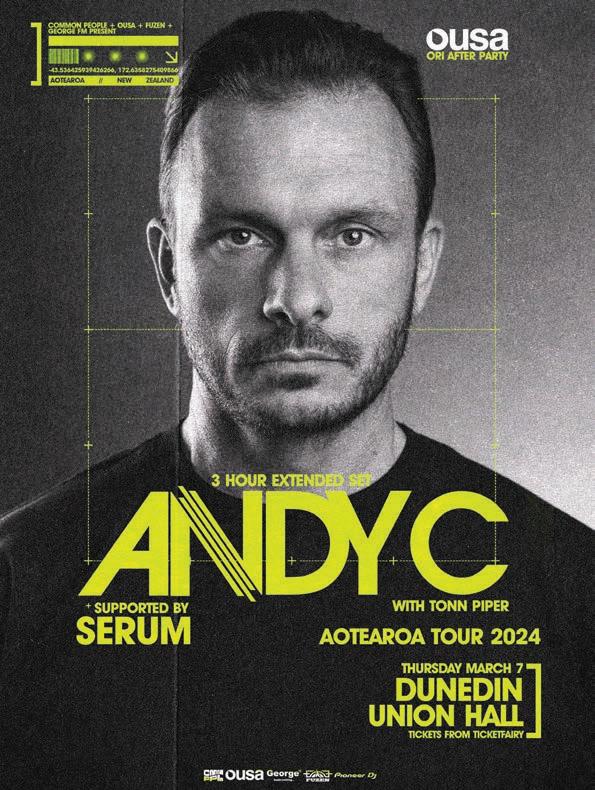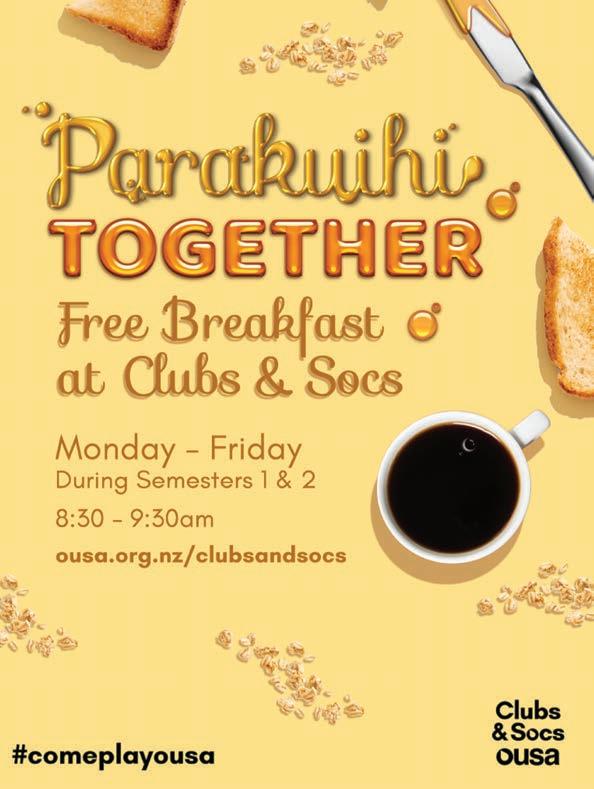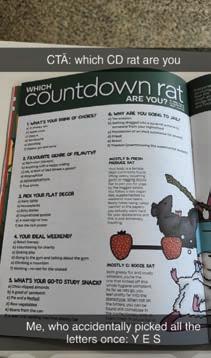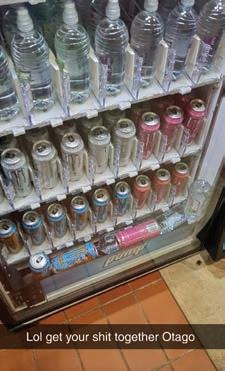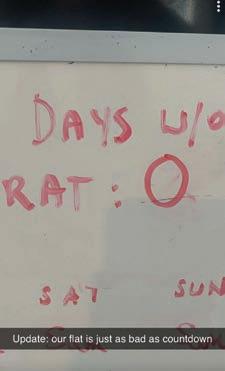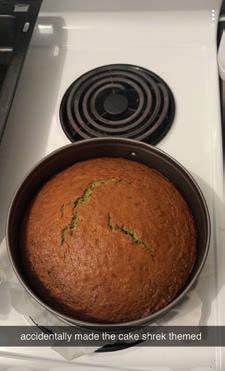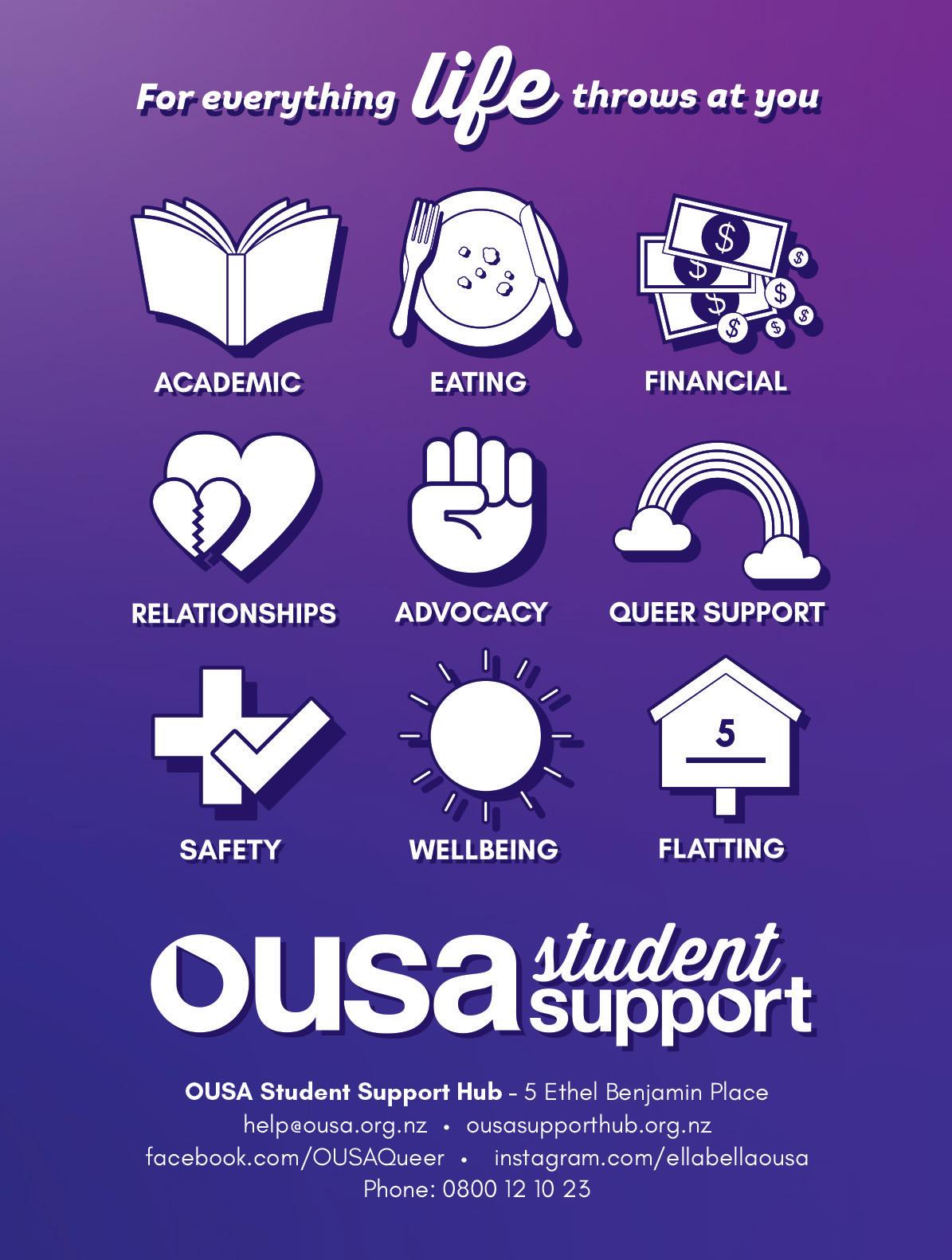




Monday - Friday 12 – 2pm

OUSA Clubs & Socs
Full menu available at bit.ly/ousa4lunch







Monday - Friday 12 – 2pm

OUSA Clubs & Socs
Full menu available at bit.ly/ousa4lunch

To the OUSA Exec: I am sorry for failing you. Let me explain.
As the news editor last year, I sat in on (almost) every weekly OUSA Exec meeting. For the most part, it was all very boring once the thrill of the invite wore off. The process was painfully formal, with each step of the meeting signalled by a “motion” that Donna (OUSA secretary and Mother) would dutifully note down. They even had to pass a motion giving Donna “speaking rights” each time. I was only given speaking rights once. The minutes from these meetings are actually publicly available on the OUSA website, not that anyone reads them. I barely did, and it was my job – though I wasn’t quite bright enough to realise it.
In between scrolling through Facebook on my laptop, pretending to take the odd note or two – jotting down important dates etc., but mostly to make fun of the Exec members’ verbal faux pas – I noticed that a recurring challenge the Exec spoke about was how to increase engagement.
The Admin Vice President was bending over backwards trying to get more students to engage with the work of the Exec. That’s the whole point of their roles, after all: they’re there to represent students. And that can be a bit difficult if students aren’t telling them what they need.
A quick flick through Critic’s archives will tell you that the worry about apathy towards student politics isn’t new. In the ‘60s – interspersed with letters to the editor wailing over girls wearing pants on campus and racist opinion pieces shitting on immigrants – Critic was also reporting on lack of engagement. There’ll always be peaks and troughs, but 2023 was a deep fucking pit for student politics. Four out of ten of the Exec positions ran uncontested, including the President, a position that in the past attracted controversy rivalling that of the US election (well, not really, but you get the idea).
In 2017, the race was so tight between presidential candidates that there were tiffs over how much each spent on their respective campaigns. Critic was even dragged into the foray with accusations of “undermining the integrity” of the election with reports allegedly showing bias towards certain candidates. At the forum last year, Keegan sat on stage in front of her homies and spun a yarn about pelicans in a tight race between
This is where the apology part comes in. I am sorry that it took a summer of reading through past years’ issues of Critic Te Ārohi, which dutifully reported on the goings on of OUSA and documented various bits and gags, to get it in my thick skull that it’s Critic’s job (not the AVP’s) to educate students on what OUSA gets up to and why you should care. One of the major reasons why Critic was created was to function as a fourth estate for OUSA (like a watchdog, for those who haven't taken MFCO103).
At the end of the day, this is actually an apology to students. Without Critic fulfilling its function as the nark of OUSA, the 2023 Exec ran amuck, largely neglecting their duties toward the end of the year, and being paid their honorariums anyway. An honorarium is like a salary for elected positions, paid only on the basis that members are actually doing their jobs. Each quarter, Exec members write reports on what they’ve been up to and vote on whether everyone should be paid.
The Political Rep was paid her honorarium despite being absent at most meetings, choosing instead to Zoom in from the comfort of her bed. An odd habit from the Political Rep in an election year. A stern word was had with the Welfare Rep who copied and pasted her quarterly reports and didn’t fulfil repeated promises of drafting a sexual misconduct policy. She also literally admitted to me at a party towards the end of the year that she had “checked out of the role months ago.”
So, I’m sorry. I am absolutely sure that Keegan being the President alone will increase engagement just through her shit-eating aura, and we’ll be following the Exec’s every move like a chihuahua yapping at their heels. But only if I’m given speaking rights.
EDITOR
Nina Brown
SUB-EDITOR
Ellie Bennett
NEWS EDITOR
BY FOX MEYER
Hugh Askerud
FEATURES EDITOR
Iris Hehir
CULTURE EDITOR
Lotto Ramsay
ĒTITA MĀORI
Heeni Koero Te Rereuoa
STAFF WRITERS
Harriette Boucher, Jodie Evans, Jordan Irvine, Gryffin Powell, Angus Rees
VOLUNTEER REPORTERS
Monty O'Rielly, Adam Stitely, Sam Soppet
BOOZE REVIEWS
Chunny Bill Swilliams
DESIGNER
Evie Noad
SUB-DESIGNER
Sarah Kreft
ILLUSTRATION
Mikey Clayton @itsspikeymikey
Aria Tomlinson
Jakira Brophy @jakira.art
Lucia Brown @labfolio_
PHOTOGRAPHER
Sophia Niblock @fairmaidphotography
VIDEO EDITORS
Hunter Jolly, Ryan Dombroski
VIDEOGRAPHY
Sam Soppet, Hugh Askerud
CENTREFOLD
Sophia Niblock & Evie Noad
FRONT COVER
Jakira Brophy
ONLINE
Will Wray
DISTRIBUTION
Pedals Dunedin
ADVERTISING SALES
Nicholas Hanover
Jess Lake sales@planetmedia.co.nz
03 479 5361
READ ONLINE critic.co.nz
Issuu.com/critic_te_arohi
GET IN TOUCH critic@critic.co.nz
Facebook/CriticTeArohi
Tweet/CriticTeArohi
03 479 5335
P.O.Box 1436, Dunedin
Critic Te Ārohi is a member of the Aotearoa Student Press Association (ASPA).
Disclaimer: The views presented within this publication do not necessarily represent the views of the Editor or OUSA.
NZ Media Council: People with a complaint against a magazine should first complain in writing to the Editor and then, if not satisfied with the response, complain to the NZ Media Council.
Complaints should be addressed to the Secretary: info@mediacouncil.org.nz.

Gidday Critic.

This week you published a letter about flat hazing which pointed the finger of responsibility at shit landlords. I suggest we be very careful what we wish for. How, exactly, would any landlord (shitty or otherwise) stop hazing rituals when all participants are presumably consenting adults? Do we really want to encourage landlords to become nosy, controlling busybodies, continually checking up on tenants at all hours of the day? Would landlords be expected to call campus watch or the cops if any party gets too boisterous for their liking? Perhaps they would have a flat rule that no parties or gatherings are allowed? I'm sure that would go down well.
I'd prefer to think all students -- hazers and hazees -- are adults and have personal responsibility for their actions. The last thing we want is for shitty landlords to become something akin to toxic, controlling step-parents.
Yours,
Doug Fraser
Kia ora,
Send letters to the editor to critic@critic.co.nz to be in to win a $25 UBS voucher.
Welcome to Dunedin / welcome back to Dunedin! I wish the welcome could be 100%, but look at the photo [Editor’s note: The photo shows a pile of rubbish]. This stuff was collected by two of us in about 15 minutes in lower Park Street, Regent Road, and a bit of Queen Street. We carried it up the hill to rinse and include with our recycling, but couldn't pick up the broken glass (even if we'd wanted to) because it won't be accepted in the blue bin. Anyone who has drunk too much to deal with their recycling has drunk too much. Please encourage your mates to keep Dunedin a place worth living in.
Elizabeth Duke (alumna)
Hi,
I have in my savings, my manager and any other workers involved have to go through the exact same shit. I’m not risking being homeless just because your 2003 ass doesn't realise 21 is younger than 25.
Sincerely,
The dead-eyed checkout worker who’s tired of having to confiscate your alcohol Editor’s response: You’re so real for that.
Response to issue 1 letter of the week:
Hey Aidan
After being yelled at by 2nd year breathers partying down castle for being a fresher (I'm not), I think now is the time for us to start shaming the 2nd years. These bluds are shitting on the freshers in o-week despite not even starting their course yet, and having Mummy and Daddy to help clean their new flat for them (I saw it happen numerous times down castle). But I need your help critic viewers, what should we call them? Sophomorons? Sophers? Or perhaps moros, which means foolish in Greek and is where the "more" in sophomore is derived from. You decide.
Thanks for reading,
Angry 3rd year
On behalf of the supermarket wage slaves: Y’all either need to start bringing your ID when you go to buy booze or get better at hiding your group purchases. ESPECIALLY YOU FRESHERS.
You gotta understand- if I knowingly sell booze to you without proper ID and you turn out to be underage, not only am I gonna lose my job and get fined more money than
Saw your letter. Thanks for reading the pieces! I think you're bang on, and this was a huge piece of the piece that I didn't have space to look into for the Spinoff articles. But I'm actively looking into it. If anyone has information on landlords and their relationship with flat hazing or profiting off the celebration of depravity, send me an email via Critic's inbox. And while I agree that it is NOT a landlord's job to police what the tenants do (dangerous can of worms), it is their responsibility to care if they are actively and intentionally profiting off of this culture. It's their moral duty - but I don't expect that to find much purchase in the landlord community.
Chur Fox‘Fringe Fest Gettin’ Fruity’: We wrote in this news piece that “most events at Fringe Festival can be accessed through virtual attendance". While there is a small selection of international online events, virtual attendance is uncommon and the vast majority of the festival is in-person. Getting bums into seats in Dunedin venues is one of the main goals of the festival, as Jordan elaborates in their opinion piece in this issue.
‘Campus Watch, Watched’: There are 900 CCTV cameras across campuses across the country, not just in the Dunedin campus.
Radio One’s Golden Ticket drops this week
Dunedin Party Supplies was shut down after SSDP took issue with their home nang delivery service
The South D Countdown is finally open
Got a tip? Seen a curry grenade thrown through a window on castle street? Send news tips to news@ critic.co.nz!
Radio One Market Day is this Wednesday, March 6
The govt is rushing through legislation abolishing the Māori health authority and smokefree laws. Just quietly: the flying fuck?
Newshub was put on the chopping block last week, with up to 300 people expected to lose their jobs. Critic’s journalists wonder at our job prospects
Rumour has it Deathstar spent $6k on their O-Week Castle host set-up
If you spend $10 at the Albany St Pharmacy you get a little goodie bag including everything from vitamins to condoms and makeup.
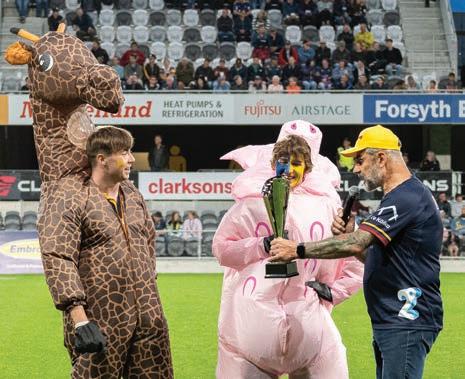
Weekly OUSA pilates is starting this Wednesday! Sign-up for the 10 week course on the OUSA website
Ski Club is in the Otago Room at the Clubs and Socs building Monday 4th from 10-4 taking sign-ups, membership payments, and confessions of love (for skiing)
In a club? Send notices and updates to news@critic.co.nz.
OUSA’s official Highlanders jersey is number 8. Ardie Savea vibes
The Audio Visual Drop Kicks are releasing their new single at U-bar this Friday, 9pm ‘til late
Send your sports results or notices of upcoming competitions to news@critic.co.nz
Congrats to the Studholme pig and Te Rangihīroa giraffe that tied in the Inflaty 180
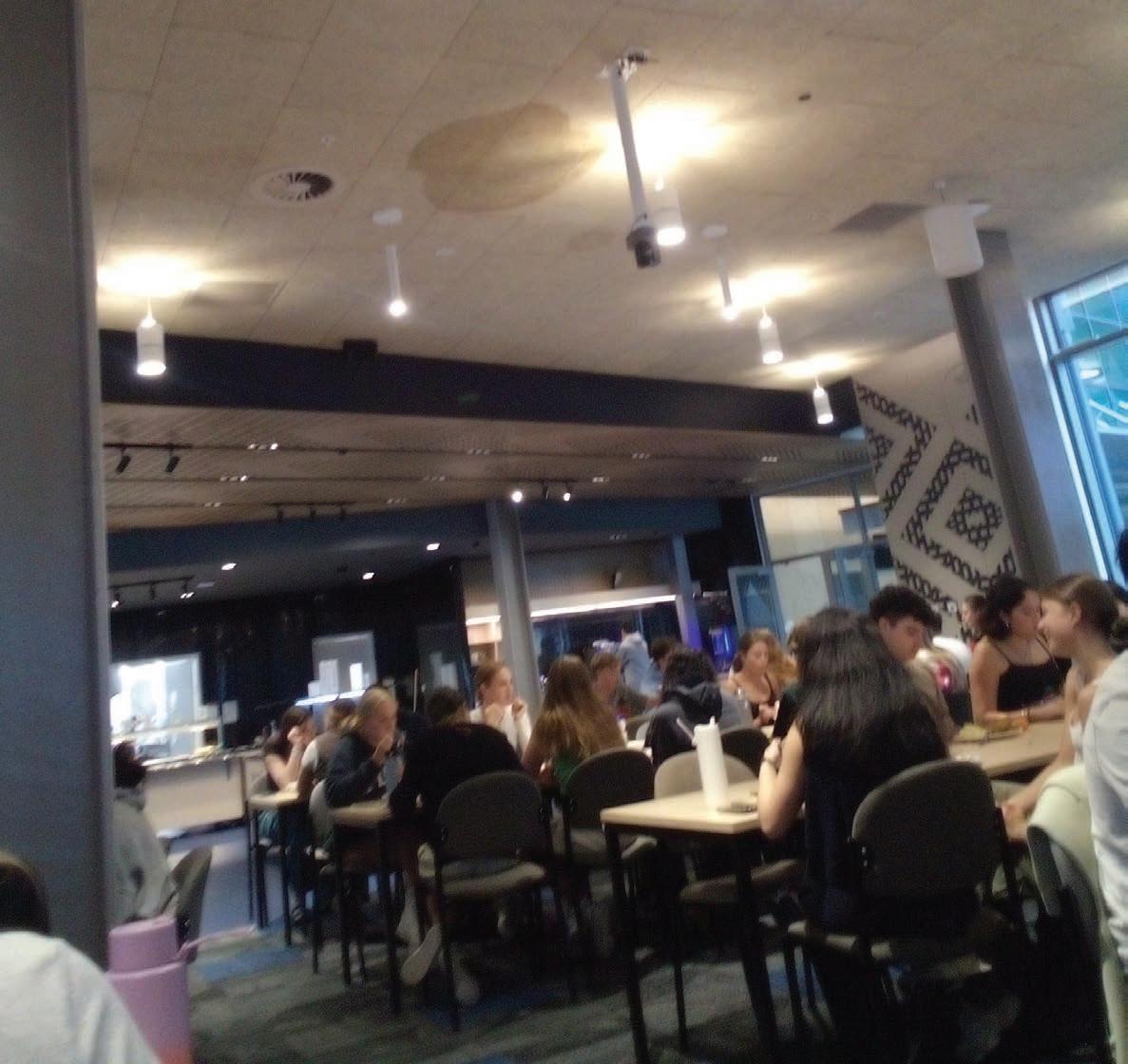
Te Rangihīroa closed floors from flooding within 24 hours of move-in
Shit went down (literally) at Te Rangihīroa College in O-Week after a blocked drain forced the college to close part of its firstfloor due to flooding. The blockage happened on the morning of Sunday, Feb 18 – about 24 hours after new residents moved into the $100 million behemoth (no one is safe from rampaging freshers). While the blockage was being fixed, 16 residents were relocated, spending their very first days at the hall marooned on the emptyish third-floor. Welcome to Dunners.
Speaking to the extent of the flooding, University Director of Campus and Collegiate Life Services James Lindsay told Critic, “A small area of carpet tiles in the adjacent corridor and whānau room, and some carpet within a bedroom of one of the relocated students, were damaged. In addition, there is some damage to ceiling tiles in the floor below.” Said ceiling happens to be smackbang in the middle of the main dining hall and can still be seen upon entrance.
On the Sunday evening of the event, damage to the ceiling meant the dining hall had to be closed for the night and everyone got to enjoy a meal outside, lest they be dripped on mid-feed. Some students speculated that the kitchen may have had to close down partially as well, with one student telling Critic Te Ārohi, “The dinner was pretty trash that day, basically just a hunk of meat.” In addition to the dining room interruption, another resident, Harry, said, “It smelt like shit for a few days,” and he wasn’t talking about the Gregg's factory stench. His mate was similarly aggrieved, saying, “It’s pretty awful really.”
Outside of these two, everyone else was strangely apathetic. We couldn’t actually find another Te Rangihīroa student pissed
By Hugh Askerud News Editor // news@critic.co.nzoff by the fact that their fancy new hall fell into shit’s creek on day one. One student, Angie, said, “Things like this happen,” while her friend Jerome argued, “There really wasn’t that much of an impact.” A Selwyn breatha, Rider, who had heard about the carnage mused, “All those other first-years moved into their brand new hall and then it flooded [...] that’s pretty funny to me.”
What has been puzzling students is how the flooding actually happened. James Lindsay told Critic Te Ārohi, “Plumbers were unable to identify the cause when clearing the blockage.” Lindsay confirmed that camera checks had been done on the area, as well as to other sites around the hall, affirming that no more damage would have been done by rogue sewage, yet scant evidence was found for a potential culprit.
And then a rumour surfaced; whispers echoing in the hallways of the college: “Someone tried to cook noodles in their sink.” Multiple students reported this to be the case when questioned, though most were sceptical on the likelihood of the yarn actually being true.
The story goes that a sink was (allegedly) left running in an ensuite bathroom whilst the cooking ensued, eventually causing a blockage after the water was left to sit. Critic Te Ārohi departed the hall with a pep in our step; regardless of its basis in evidence, the rumour has been circulated throughout the college and may just fester into the kind of mythic tale any fledgling hall needs to build community.


Sensing blood in the water, several alcohol companies have engaged in a cut-throat competition to secure student tastebuds over the Flo and O-Week period. The increased competition comes after a number of new RTD brands entered the student market, letting the old guard of Cruisers pass gently into the morning after. While a fuckton of Cruisers were still bought (let’s be real), it was the new kids on the block – your Deletes, Majors, and Kirin Hyketsus – who really made waves in Studentville this time.
Though the competition was as fierce as a Knox vs Selwyn game of ping pong, there could only be one drink to rule them all. To absolutely no one’s surprise, that drink was Kirin Hyoketsu, the Japanese RTD that’s rampaged into our hearts and livers.
Stats from Leith Liquor reveal that Kirin Hyoketsu was the most popular drink over the two-week Flo and O period, followed by Tui’s and Summit Ultra cans. Mase, the duty manager at The Bottle-O Cumberland, told Critic Te Ārohi, “Probably every third person would come in for it [...] some would just walk in and not even look around before heading for it.”
These changes in drinking habits don’t appear to be isolated. Tumua, the store manager at Leith Liquor, told Critic Te Ārohi that “six years ago it was 20 bucks, this year 31 bucks,” when asked how average spending had changed in the student area. Tumua’s comments offer a glimpse into the growing alcohol market in North Dunedin, one which has seen its fair share of new drinks over the years.
Yet, in 2024 an unprecedented level of marketing in Studentville has seen several health initiatives take a stance for students, citing the dangers that large-scale marketing serves to play in the
By Hugh Askerud News Editor // news@critic.co.nzlife of the student. Students for Sensible Drug Policy chairman Max Phillips said, “If it was just us students driving Otago’s drinking culture, it would still be bad, but at least it’d be ours and we’d be responsible for the good and the bad.”
Max called the recent advertising “extremely predatory.” Not one to mince his words, Max went on to say, “Flo and O-Week has played out like a turf war between these alcohol brands, all trying to gaslight students to associate their brand of ‘sugar-soaked date-rape in a can’ with the good times of Flo and O week.” Goddamn.
The marketing cited by SSDP has taken place in the form of tasting stands, free merch, and brand associations with popular Dunedin venues. Kirin Hyoketsu were cited by SSDP as a crucial brand in the “turf war,” with one student, Liam, saying, “It’s everywhere, everyone knows about it.” Another student, Rider, said, “They had tasting stands everywhere and were giving away hats and t-shirts on campus.” Yet Mase had a different theory, arguing that “before all the advertising people were buying it. Just word of mouth, friends telling friends.”
In coalition with SSDP, Sarah Sneyd from Alcohol Healthwatch argued that the effect associated with such advertising was significant. “Sponsoring free alcohol puts pressure on people to drink and is associated with increased binge drinking […] this population seems to continue to tantalise the industry, who find more and new ways to embed themselves into the student drinking culture.”
So there ya have it; Kirin Hyoketsu is the unequivocal champion of O-Week. They didn’t get on the decks at DeathStar or smuggle a hook-up into their hall, but they did sell a fuck ton of alcohol.
Dunedin City GP have set up a new low-cost clinic aimed at easing disparity in health outcomes for students and other (likely more deserving) groups. The change comes after Student Health wait times have lengthened to a criminal degree in recent years.
The new centre will be a Very Low Cost Access (VLCA) Clinic and go by the name of Dunedin Community Health (DCH). Up to a quarter of Aotearoa’s current medical practices are VLCA clinics, and North D’s hopping on the bandwagon. Those going to DCH will access the same staff, location, and facilities as those at Dunedin City GP but for $15 compared to the normal $52.50. That’s a deal so good it almost puts the Radio OneCard to shame.
Speaking to Critic Te Ārohi on behalf of the new clinic, Dr Adrian Hindes said that they will be prioritising those who live in lowincome areas, and Māori and Pasifika. “If you don’t meet these criteria, the next best step is to apply for a community services card,” which most students are eligible for and gets you an appointment for $19.50.
Despite the scariness of healthcare as an adult (Mum, please help), it's crucial to note that DCH has significantly expanded the healthcare options available in Dunedin. Adrian said that students “definitely” come to Dunedin City GP due to Student
Health wait times.
By Gryffin Powell News Reporter // news@critic.co.nz“We are a family practice, but nearly 10% of our patients are university students,” Adrian told us. “We've heard many students speak about a 2-3 week wait to see a doctor at Student Health. Our wait times are currently 1-2 days. If no doctors’ appointments are available on the day, then book to see one of our nurses.”
With a recently added third doctor, there is plenty of capacity for new patients to receive affordable care amidst the ongoing cost of living crisis that’s allegedly seen food items increasingly becoming the target of burglaries. Adrian pointed out that the clinic will also function as an option for recent graduates who can no longer access Student Health but still can’t quite afford the prices of a regular GP consult (otherwise known as the ‘Buy a MedicAlert’ category of Critic's Dunedin Old test).
For those who are making the big bucks (above the current living wage of $26 an hour), Adrian encourages you to enrol for Dunedin City GP, knowing your market rate consultancy is financially supporting the freshers at the DCH. The clinic is located at the bottom of Pitt Street, just across from Knox Church, a distance even the dustiest breatha can make for a casual STI check.
A bad batch of gear was making the rounds during O-Week, leaving students both impoverished and with post-consumption tummy aches.
On Thursday, Feb 22, Know Your Stuff (with the unfortunate acronym KYS), the national drug-testing agency, issued the warning, “Several samples presented as MDMA in Dunedin have come back as a Novel Synthetic Cathinone or Bath Salts.” For the people who don’t religiously follow licensed drug-testing agencies (probably should if you’re on the nose beers) that may come as a shock.
Gauging the extent of the damage, Critic Te Ārohi spoke to Max Phillips, the KYS co-regional manager. His anger (at the shitheads lacing drugs) was palpable when he said that “a group of students were left violently shaking and feeling ‘like death’ after taking synthetic cathinones which were misrepresented as MDMA.” He went on to say that further testing would need to be done to determine what the MDMA was laced with. Lack of information on the substance’s origins means the agency is signalling that the chemicals found within the substance could be more harmful than anything seen before.
Whilst bath salts lowkey get the job done (don’t tell your mates), Know Your Stuff warns that users taking synthetic cathinones can suffer adverse side effects such as hypothermia, abnormal heartbeat, insomnia, and even paranoia in extreme cases. The
By Monty O’Rielly Volunteer Reporter // news@critic.co.nzdrug also isn’t on that “I fuckin’ love you so much” level that comes with a cap. When asked if he would do laced MDMA knowingly, one student, Ethan, said, “I wouldn’t do it if I knew they were bath salts […] It’s just stupid.” But regardless, he reckons "everyone does it at some point.”
The scientists at Critic Te Ārohi estimate that a gram of gear sets you back around $200, a price few students would be willing to flush down the drain. Like many people's approach to Covid right now, if you don’t test, there’s no saying it’s anything other than what you paid for.
If you’re opting for the Schroedinger’s cat approach, Know Your Stuff recommends “starting with small amounts, avoid mixing it with other psychoactives, and to look out for the signs of overdose: sharp headache, muscle rigidity, rapid or racing heartbeat, hyper or hypo-thermic body temperature.”
Some claim their dealers test drugs before sending them out, with one student telling Critic Te Ārohi, “I knew there was something going around but my guy is trustworthy and tests all of his stuff before sending it cause he buys in bulk.” Others weren’t as certain, with one student, Poppy, stating, “It’s pretty dodgy […] it’s so awful doing that sort of thing to us.” They’re still drug dealers, kids.
No more samples of the bath salts have been found since the Thursday of O-Week.
It’ll cost you $100, though
The Meningitis Foundation has started a national campaign urging students to get vaccinated and highlighting the extreme risks of the disease. This push for vaccination comes after a smattering of individual cases have been reported at the University over recent years.
Margaret Perley, the Head of Student Health Services at Otago, described meningitis as “an incredibly dangerous illness which can progress to being life-altering or fatal within hours.” Meningitis is transmitted person-to-person through droplets of saliva. The disease can be spread through the sharing of drinks, necking someone who has it, and vapes – so it’s a good excuse to keep your mates who claim they’re quitting off your hoon. Buy your own fucking vape.
A brief survey of students on campus for thoughts on the disease didn’t yield much. Asked what meningitis is, one student replied, “I know it's a disease, I don’t know what it does to you but I know it’s not good.” To which their friend interrupted with, “Yeah you can lose your fucking limbs and shit.”
Though the particulars of meningitis seem to be lost on students, it sure as bloody hell is affecting us. The 15-24 age group has been identified as being most vulnerable to the disease, with Gerard Rushton, board chairman of the Meningitis Foundation, stating that “approximately 30% of all meningitis cases last year were from people [in this age bracket]”. This was also the sole group
By Adam Stitely Volunteer Reporter // news@critic.co.nzthat saw incidents rise in 2023, growing from 13 to 18 cases.
Rushton regards this increase as unacceptable, explaining, “This group of young people need protection […] and many aren’t aware that there are funded vaccines available to them.” Perley added, “Many students may have been vaccinated in childhood for meningococcal B, however this vaccination is not considered to still be protective,” making students susceptible to catching the disease.
Vaccines are currently fully funded for New Zealand citizens in close living situations, which includes residential colleges, military barracks, and prisons. Let’s hope it’s the foremost.
The fight to eliminate meningococcal is now focused on expanding the eligibility criteria for vaccines, so that all young Kiwis can have access prior to university. If you aren’t in a hall, vaccines can be purchased for a pretty penny via Student Health, with two vaccinations available — both at around $100.
Saying what we’re all thinking, Rushton pinpointed the cost associated with vaccination to be a “key barrier” in stopping the disease’s spread. He stated, “We believe the low vaccination rates are directly related to the fact that the eligibility criteria for free vaccines are too confusing and too narrow. We know New Zealanders want the vaccine when it is available to them. Why are we withholding it?” Facts.
“Book the fucking limousine”
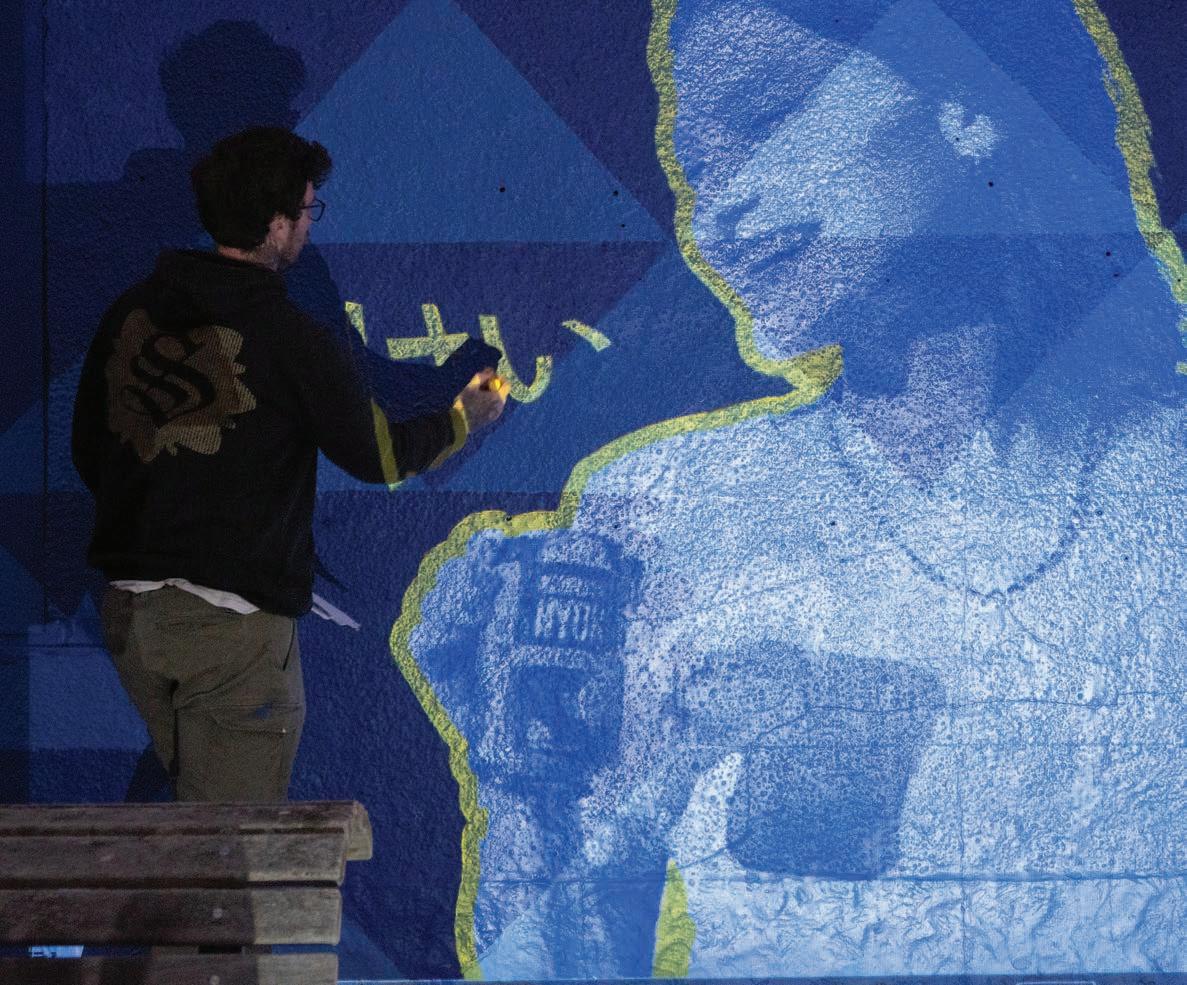
The Dairy, one of Castle Street's most recognisable derelict buildings, has been given a fresh coat of paint after Japanese RTD behemoth Kirin Hyoketsu paid for its temporary use as an advertising billboard.
This comes after The Dairy, corner-shop-turned-flat, has stood unchanged for over a year since residents cleared out in 2023. Then, on the Tuesday of O-Week, the building was painted by Jonny4Higher, an Auckland muralist shipped down by Kirin Hyoketsu for the task of adding to the brand's advertising blitz throughout the city.
The unused building was booked through an out-of-home media company, just like you would book a billboard. Lion Breweries, the manufacturer of Kirin Hyoketsu, told Critic Te Ārohi, “We booked a short-term slot to raise awareness of this new product and when our slot ends, The Dairy will be repainted white.” This means it's unlikely we will see The Dairy reclaim its status on Castle Street as it bends to the will of advertisers. Keep an eye out for the bright green of our OUSA overlords in the coming months.
Other brand activity in Dunedin (which is not focused on any particular area) has included marketing in bars, sampling in retail, and street posters – all in line with the Sale and Supply of Alcohol Act requirements, before the ODT gets any ideas.
By Sam Soppet Contributor // news@critic.co.nzWhilst Kirin Hyoketsu were certainly pleased with The Dairy’s new drip, Students for Sensible Drug Policy certainly were not, telling Critic Te Ārohi that the flat was given “a vomit-inducing blue and yellow glo-up just before O-Week.”
Other students weren’t as bothered. One student, Reuben, laughed at the thought of a boardroom of suits cooking up the idea, which he admitted was a good one, with Castle St being “one of – if not the best – spots they could have put it.”
An international student commented to us how relatively controlled New Zealand's advertising rules are when compared to other nations. “In places like Spain, you have hot chicks convincing you to try these vaping products and they often don’t ID, and that’s what the tobacco companies are paying for,” they said.
Lion Breweries denied claims that the brand was specifically targeting studentville. They said, “The majority of promotional activity is at a national level, which includes the hunt for a Hyoketsu hand-model competition” – which we intend on entering. Back off, plebs.
Whilst the blue and gold of Kirin Hyoketsu may not stick around forever, its introduction marks another change in the lifecycle of a building which has ostensibly turned into Castle Street’s one and only flat-sized billboard.

New club, who dis?
Die-hard town-mishers are counting their blessings after a new club, Residency, has opened in the building that once housed the infamous Eleven Bar. Having opened its doors on Friday, Feb 16, the bar has fallen into the natural swing of town life, fuelled by sweat, stickiness, and the throng of those giddy enough to fork out on (and spill) overpriced drinks.
Residency is owned and operated by Ian Lindsay, the current owner of Suburbia and Biggies Pizza located just across the road. Speaking to Critic Te Ārohi, Lindsay cited his decision to begin the venture as “a great opportunity to do something new for the town and for the influx of students [...] owning Suburbia across the road, I never liked to see the venue closed.”
Lindsay’s comments reference the closure of Eleven Bar, shut down after having its liquor license revoked by the courts. In addition to several abuses of this license, the bar was cited as being “crook as fuck” by staff who witnessed owners drinking at the establishment, as well as several instances of sexual abuse from patrons. Addressing this history, Residency looks to pull a 180 on the building’s reputation. Lindsay hopes to give the new business a “bit of an upmarket feel and provide a safer environment.” Critic suggests a burning sage ritual.
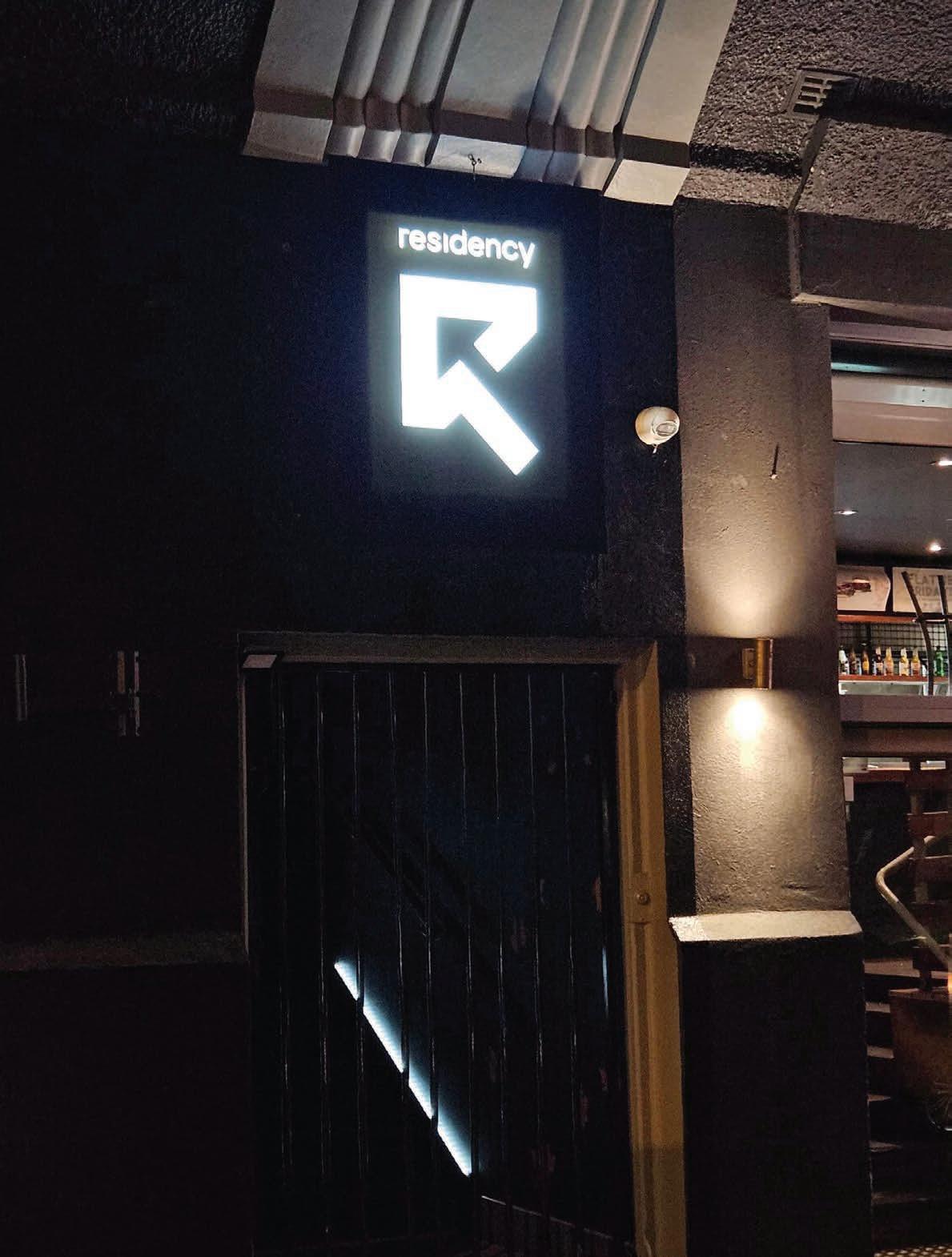 By Hugh Askerud News Editor // news@critic.co.nz
By Hugh Askerud News Editor // news@critic.co.nz
Mase, a duty manager at Residency, certainly agreed, contending that “the layout is way more approachable and friendly.” Additionally, he revealed that the venue has opened up a spot outside for smoking, meaning no one has to wait back in line after having a hoon. In terms of demographic, Lindsay said, “We play top 40 throwbacks, giving the place a really good vibe as people can sing along and dance to something a bit up-tempo.” DnB diehards lament, Residency will be the spot for all your 2000’s bangers, your place to go when you desperately need a fix of Taylor Swift’s ‘Love Story’.
Mention 2000’s bangers and students are frothing at the mouth. One student, Harry, told Critic, “I had more fun during one trip to Residency than I did any other time at Eleven Bar.” Students for Sensible Drug Policy have also given the place a green light, having requested that the Dunedin Licensing Committee urgently give Residency an alcohol license so it would be open in time for Flo and O.
Be prepared to find yourself wailing in the Residency bathroom in the coming weeks, having listened to too much Adele and other pop clangers that will leave you nostalgic for your year 10 camp. Bring some Critic stickers, while you’re at it.
Critic Te Ārohi is polling Otago tertiary students on their views on Palestine/Israel. In order for our reporting to be as accurate as possible, we need every student to fill it out than can.


it’s 100% anonymous, sign-in only prevents people from responding more than once. If you haven’t filled it out — please do! For those who feel they are uninformed, there is an ‘unsure’ option on every question. That information is just as important to collect. The more responses, the more accurate our reporting is. Please share with friends, flatmates, teammates, co-workers — any student group or community you’re a part of — so their views can be counted for.
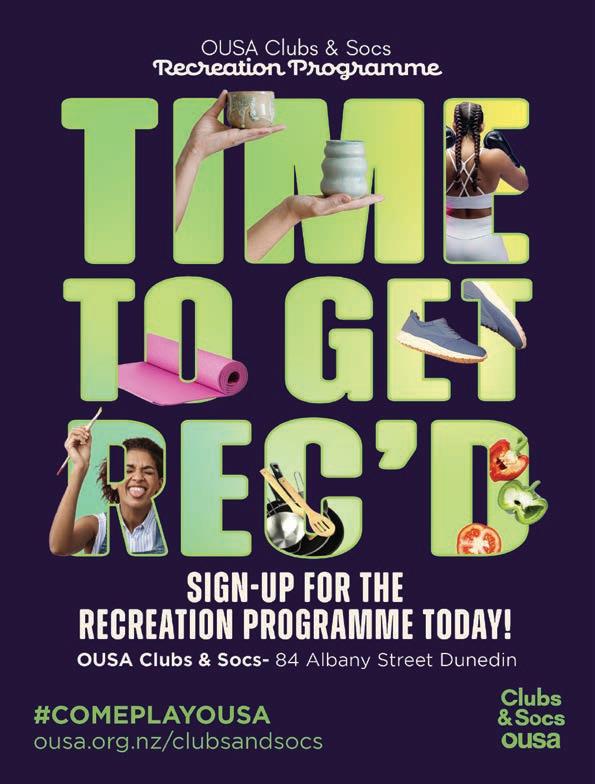



Crossword rules:
Multi-word answers are indicated by a (#)
If a clue contains a period-noted abbreviation, the answer will also be an abbreviation
If a word is in the clue, it cannot be the answer
Quotation marks around a phrase mean that the answer is a similar phrase
Pluralised clues = pluralised answers. Same for past and present tenses (-ed, -ing).
9
10
11
12
13
15
16
19
22
27
30
1
3

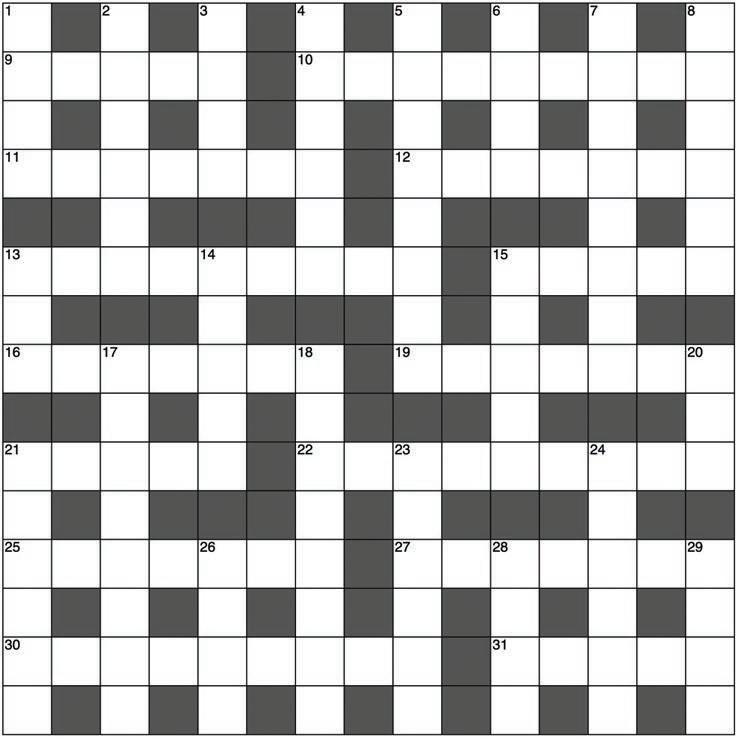

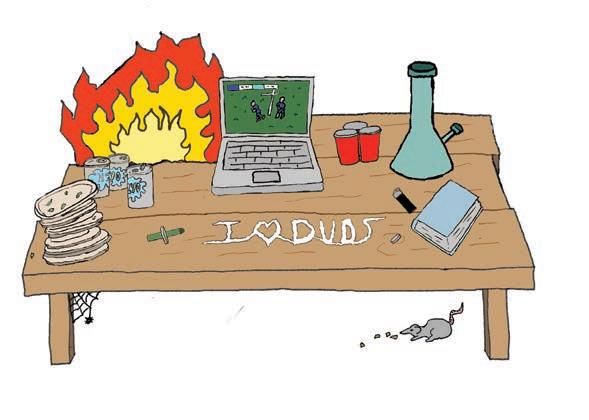
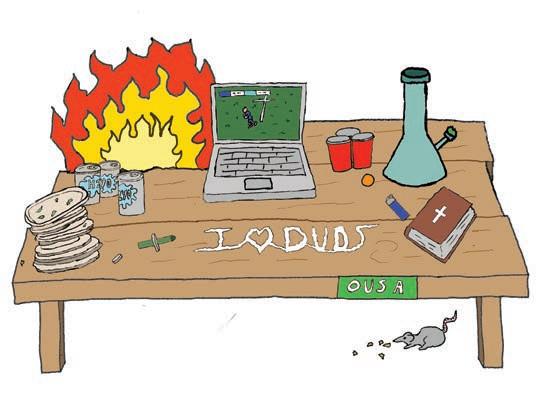




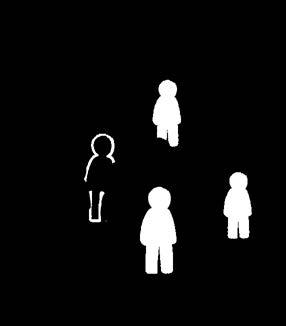
The hour has come for everyone to put their money where their mouth is. Look, we all love the idea of saving Dunedin venues – as evidenced by local movements, posters, and fundraisers – it’s just that we don’t seem to love actually getting up from behind our keyboards and going to them. I am a frequent gig attendee, but I’m often disappointed at the low turnout for bands that are claimed to be ‘beloved’. Unless it’s a major gig such as Mount Eerie at Dive (RIP), I usually expect a dozen people in the crowd, tops. It’s like we create empty venues just so that we can mourn them. But there is a solution: the Dunedin Fringe Festival starts on March 14th. Prove that you actually care about the arts (yes, all the arts) and the venues that bring them to us.
Live performance is such a unique experience that absolutely cannot be matched by streaming artists' music from a parasitic service or watching stand-up clips on TikTok. The feeling of the bass hitting your body is soul cleansing – the lights slightly illuminating familiar faces of people whom you think look cool, but feel a bit nervous being in such close proximity of – and where else will you hear a surf rock band, an experimental rapper, and an ambient artist all on the same lineup?
Theatre and the wider arts offer similar experiences, and their limitless art form can beautifully challenge your worldview. Think of the communal and interactive aspects of live art: musicians changing their set based on the vibe of the crowd, comedians altering the pacing of jokes on the fly or responding to hecklers. You just can’t get that from a podcast or Spotify. That is, if this art makes it to being disseminated online in the first place. For an artist to be able to afford online options, they usually have to start by making their money offline. That means having people show up for gigs. It’s just how artists big and small gain a following; if there’s no proof that there is an in-person market, it is unlikely that they will get bookings for larger gigs. Events like Fringe Festival are precisely how artists test the waters with new or experimental content.
We’re watching our most treasured venues drop like firstyear Health-Sci students, and all we can do is post about it. It’s especially disheartening to watch as the music scene starts to mourn the music scene. Don’t you miss Dog With Two Tails (also RIP), who wanted to prevent becoming like Sammy’s (another RIP).
I do understand and empathise. You’re burnt out, disillusioned, and feel less into Dunners than your peers still seem to be. You don’t have the energy for your assignments, much less going out. However, convincing people shouldn’t feel like work for me, and more importantly, none of this should feel like work for you, either. Enjoying the arts should be the opposite of work. It is valid you do not attend every gig that happens – and shit, I’m not asking you to – but now would be a great time to support some live art rather than hibernating in your flat. Maybe it’s because ‘supporting’ the arts has morphed into a whole brand of behaviour, rather than just enjoying something you’re interested in. Or maybe we both just need to get out more.

If you feel called out, good. If upset, you know how to prove me wrong! Running from the 14th to the 24th of March, the Fringe Festival boasts dozens of events at 31 venues across the city. If money is an issue, you’ll be happy to know that a lot of the events are koha or even free. Basically, it’s very hard to justify not going. To put it in economic terms for you Bcom students, Fringe is a lowinput, high-reward experience to see new artists and new types of art, as well as to support venues near you. Fringe runs over a 10-day period, giving you plenty of time to get out of your comfort zone and see a new space that could become your favourite. You might even recognise a familiar student face in the lineup.
Throughout this tumultuous time, you have cried out, “Let’s save Dunedin venues! Let’s save Dunedin music! Let’s save Dunedin art!” You talk the talk, yet do not walk the walk - and that’s okay. But if you are going to continue talking, PLEASE talk about the Fringe Festival. Say how great it is and all the fun events you are going to – invite friends, flatmates, and family to go with you, and if you end up not feeling it that night, at least all those people you invited will be there. In your own special way, you’ll have helped save Dunedin venues, and I appreciate it deeply. The Dunedin art scene is where I have made some of my closest friends and created the most cherished memories, but you and I can only continue to do that if there is a place for us to all go. I implore you to go to these spaces so we can continue to create and celebrate art – we’ve spent long enough feeling bad about it. Let’s go enjoy it.














14-24 mARCH 2024
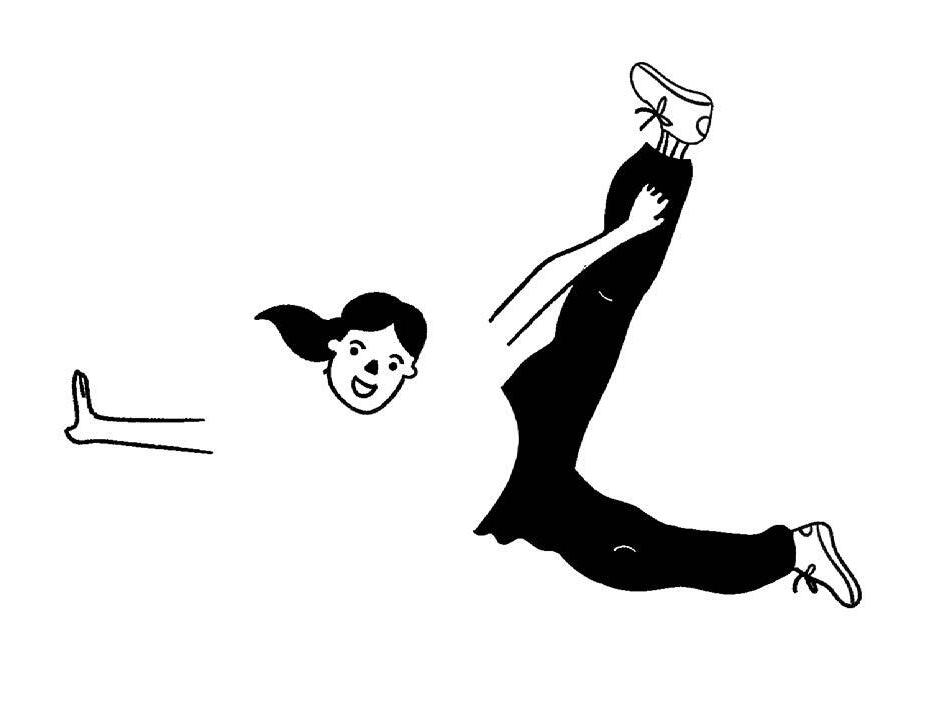















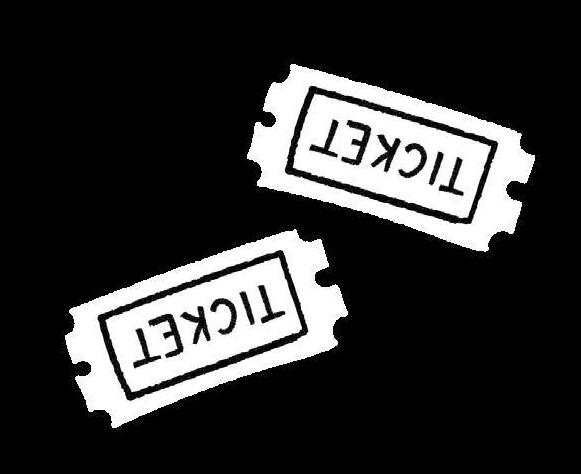

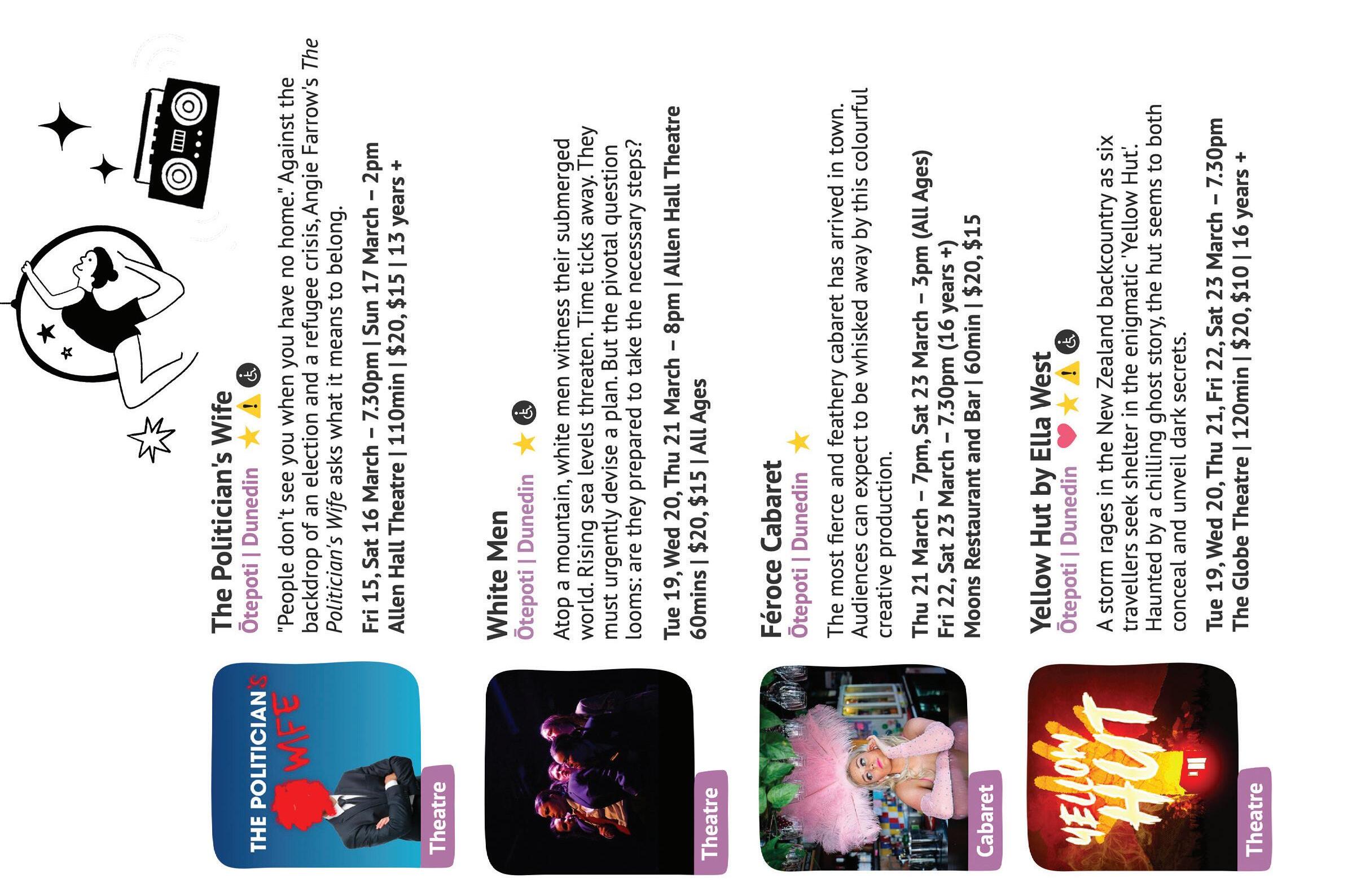


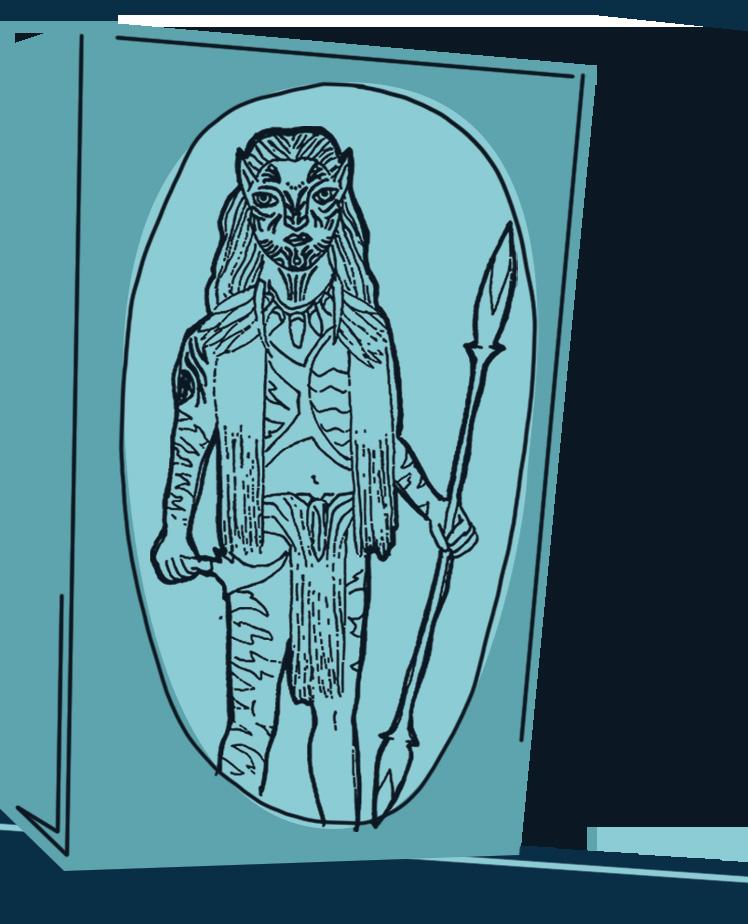
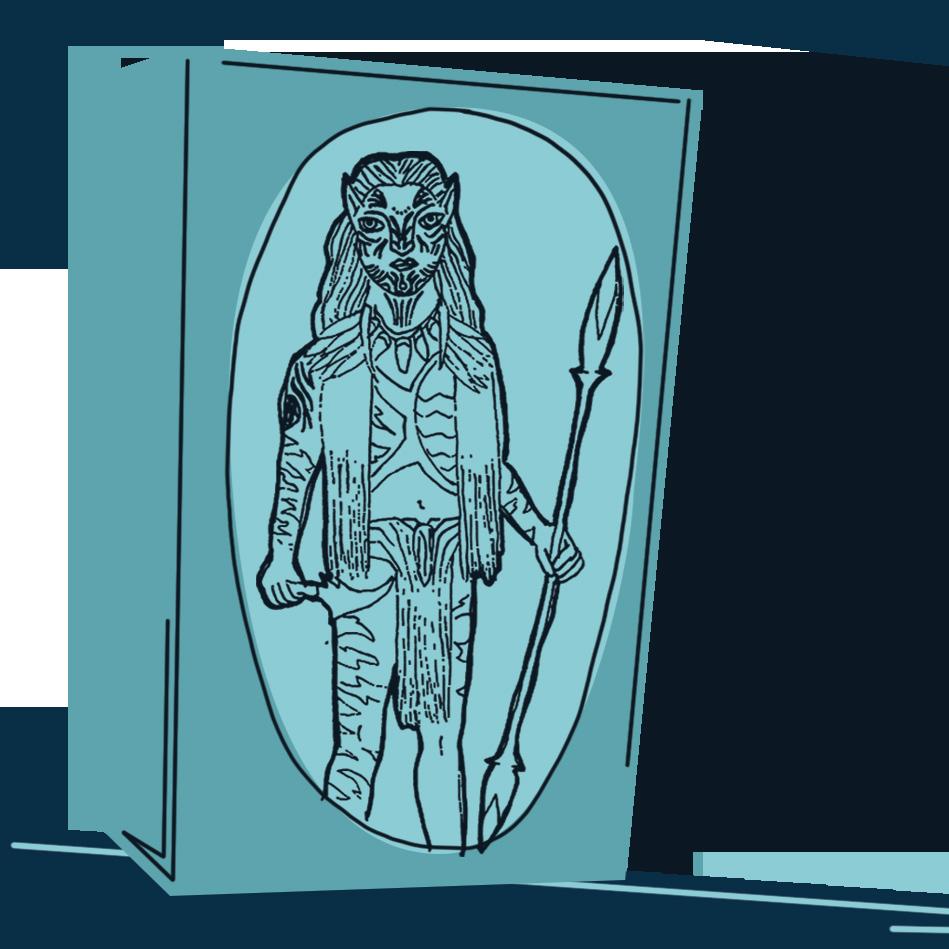
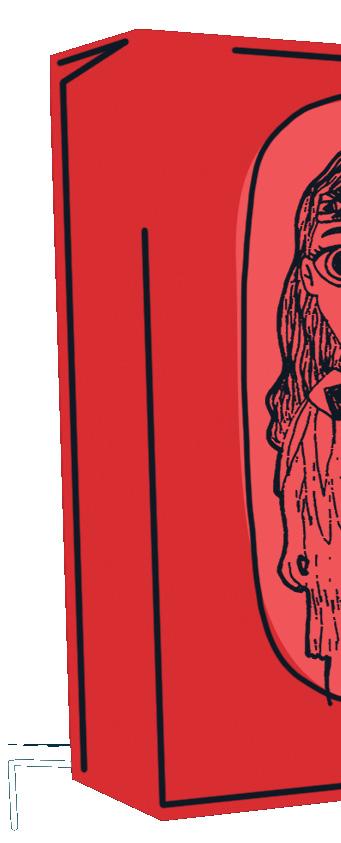
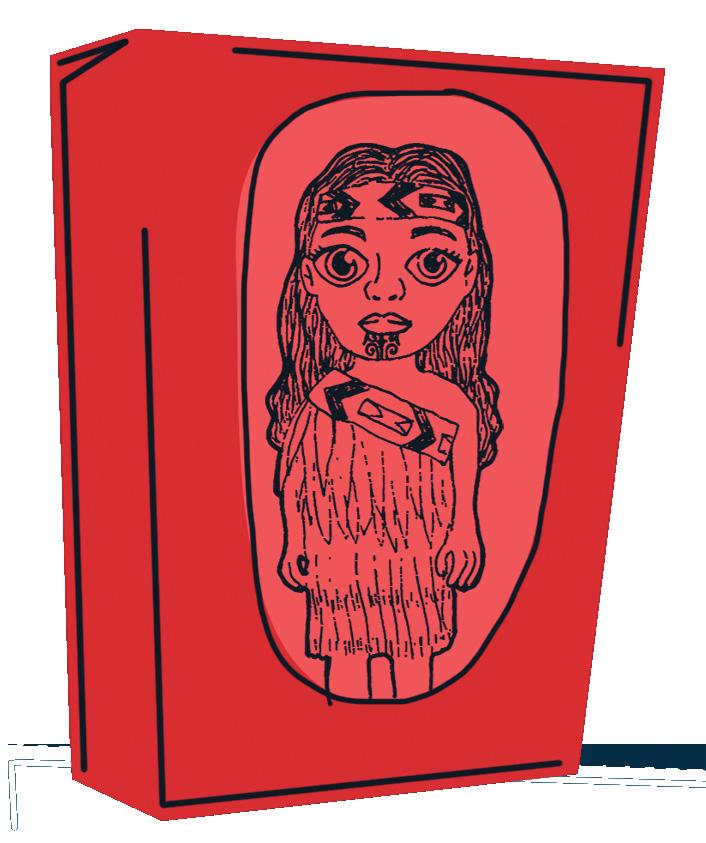
In an era where diversity is celebrated, Hollywood has found a new fascination – move over superheroes and intergalactic battles, because Māori culture has become the latest trend in the global entertainment industry. But are we witnessing a genuine celebration of diversity, or is it just another case of cultural appropriation masked as appreciation?
Don’t get me wrong, the problem here isn’t that te ao Māori shouldn't be shared with the world. But when Hollywood cherry-picks cultural elements, slaps them onto alien worlds and underwater kingdoms and calls it a day, it’s almost equivalent to adding soy sauce to spaghetti – it might taste okay, but it's just not right. But hey, who needs originality when you can borrow an entire culture for a box-office hit?
Aquaman, the aquatic superhero who spun waves across DC's cinematic universe, features Jason Momoa as the titular character. The movie sports a plethora of not-so-subtle Māori cultural references. And while Momoa himself is of Native Hawaiian descent, the decision to deck out Aquaman in a mishmash of Polynesian cultural signifiers reads more like lazy appropriation than an actual homage. ‘Diversity’ becomes a buzzword and cultural representation is a hot commodity, as it seems no culture is immune to being mined for cinematic gold. But it's not just the films alone that warrant such scrutiny; it's the broader phenomenon of shameless cultural commercialisation that accompanies them. Take, for example, the toki, a traditional Māori carving featured prominently in Aquaman's marketing and embraced fervently by its fanbase as a collectible item. Suddenly, what was once a sacred symbol of Māori culture becomes simply just another trinket to add to one's collection, stripped of its cultural context and significance. Nothing says “cultural appreciation” quite like minimising sacred cultural symbols into mass-produced trinkets for fanatics to drool over at comic conventions. Tasteless, and unseasoned.
I’m sure the producers “mean well”, and yeah, perhaps we as Māori should just sit back and soak it up, but films like Avatar and the recent Aquaman

often work to sideline Māori voices and narratives in favour of watered-down, palatable versions packaged for quick digestion. And while Hollywood pats itself on the back for its token nods to diversity, it also conveniently overlooks the fact that true representation involves more than peppering in some exotic-sounding dialogue in an effort as skin-deep as the few tattoos that have been slapped onto an A-list celeb.
James Cameron's Avatar, long-hailed for its groundbreaking visuals and environmental themes, didn't shy away from borrowing heavily from several indigenous cultures. The Na'vi, the film's blue-skinned inhabitants, bear an uncanny resemblance to various indigenous peoples, with their language, customs, and even facial tattoos echoing cultures from across the globe, with a particular focus on reimagining all things Māori.
Let’s be real: it’s clear that Aquaman speaks dearly to the hearts of many, allowing Polynesians to find common ground with an otherwise fictional character. There’s no debating that, and fairly so. But how can a film that aims to represent, truly be representative of Māori and the wider Pacific when said people are almost entirely absent from the screen? No matter how often Dwayne Johnson tries to perform the haka in his work, it just isn’t cutting it anymore. For God’s sake, it’s not 2010 anymore!

how can a film that aims to represent, truly be representative of Māori and the wider Pacific when said people are almost entirely absent from the screen?


True representation necessitates the inclusion of Māori voices, not only in front of the camera but also behind it, ensuring that the authenticity and nuances of their experiences are accurately portrayed. At the end of the day, who else could tell the story better?
And while it will always be cool to actually see te ao Māori thriving in theatres, our culture deserves to develop beyond an onscreen hongi. Where is the depth?
Iri, a fellow Northlander, spoke strongly against the online discourse regarding the release of both blockbuster films. “The most common thing I’ve heard from other Māori is that ‘at least we’re finally being recognised’, but really, we’re just perpetuating an unsung point that not only Māori but POC should be actively grateful for just being seen,” she shared. “That’s problematic. We’re not being ‘recognised’ if you need an A-list celeb to sell the story every time.”
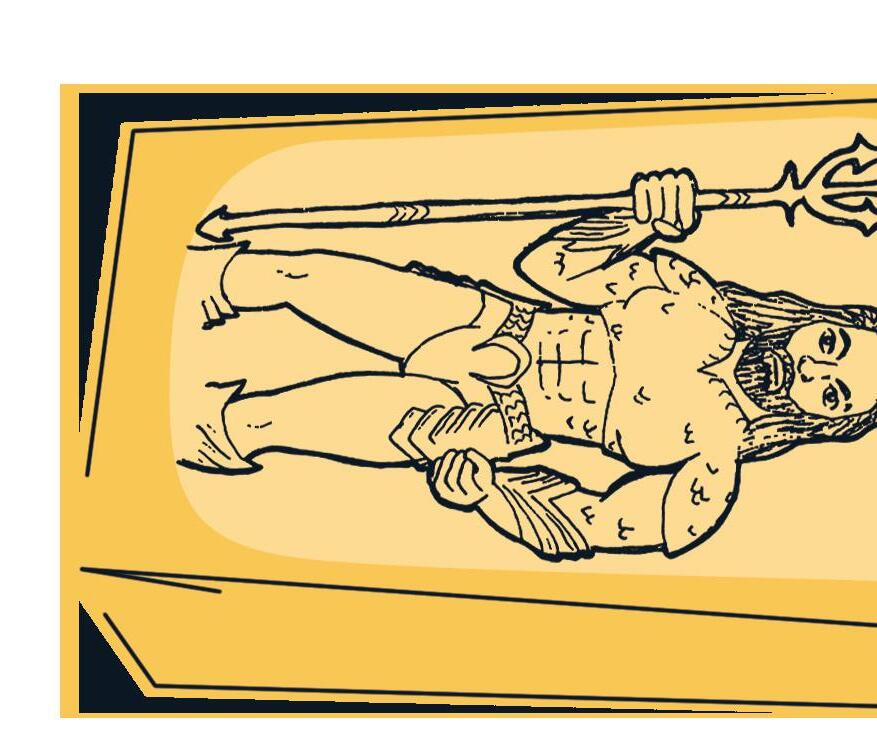
As for audiences, it's essential that we approach media consumption with a critical eye and an awareness of the broader implications of appropriation and commercialisation. There is so much more to te ao Māori than cinematic nods that barely break the surface of a living, breathing culture. So while it's tempting to get swept up in the spectacle of Hollywood blockbusters, we must remember that behind the glitz and glamour lies a deeper, more troubling reality of exploitation and cultural erasure.

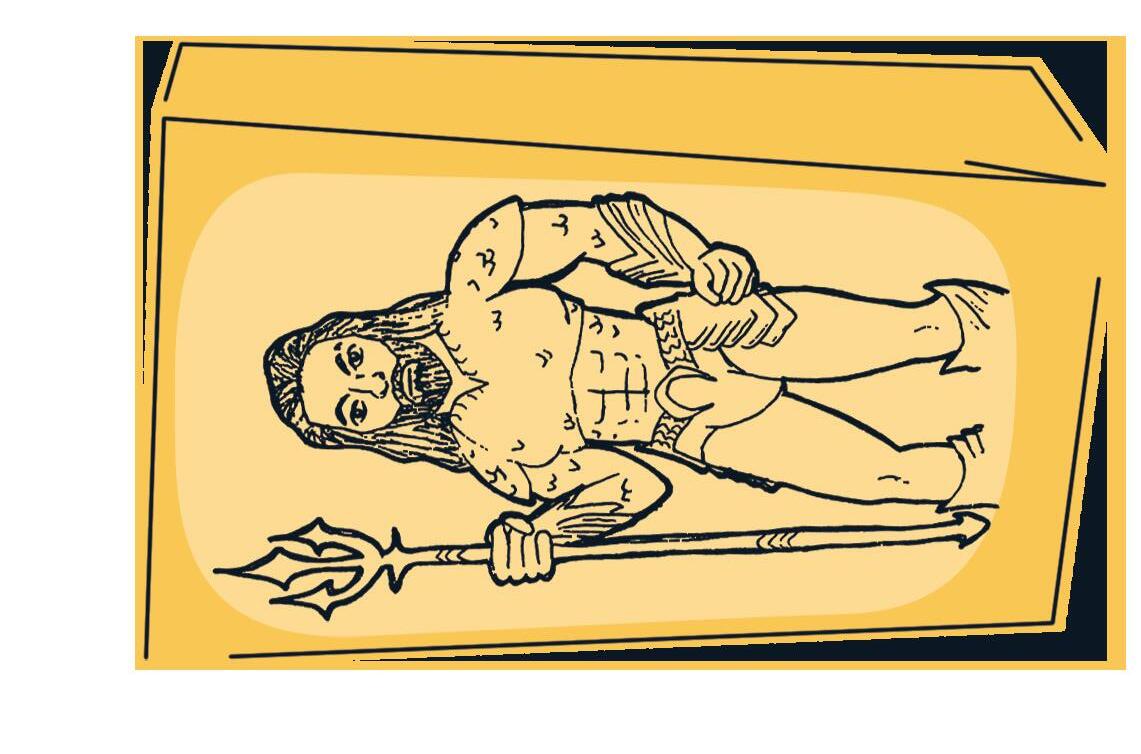
moreThereissomuch toteaoMāori thatthancinematicnods surfacebarelybreakthe breathingofaliving, culture.
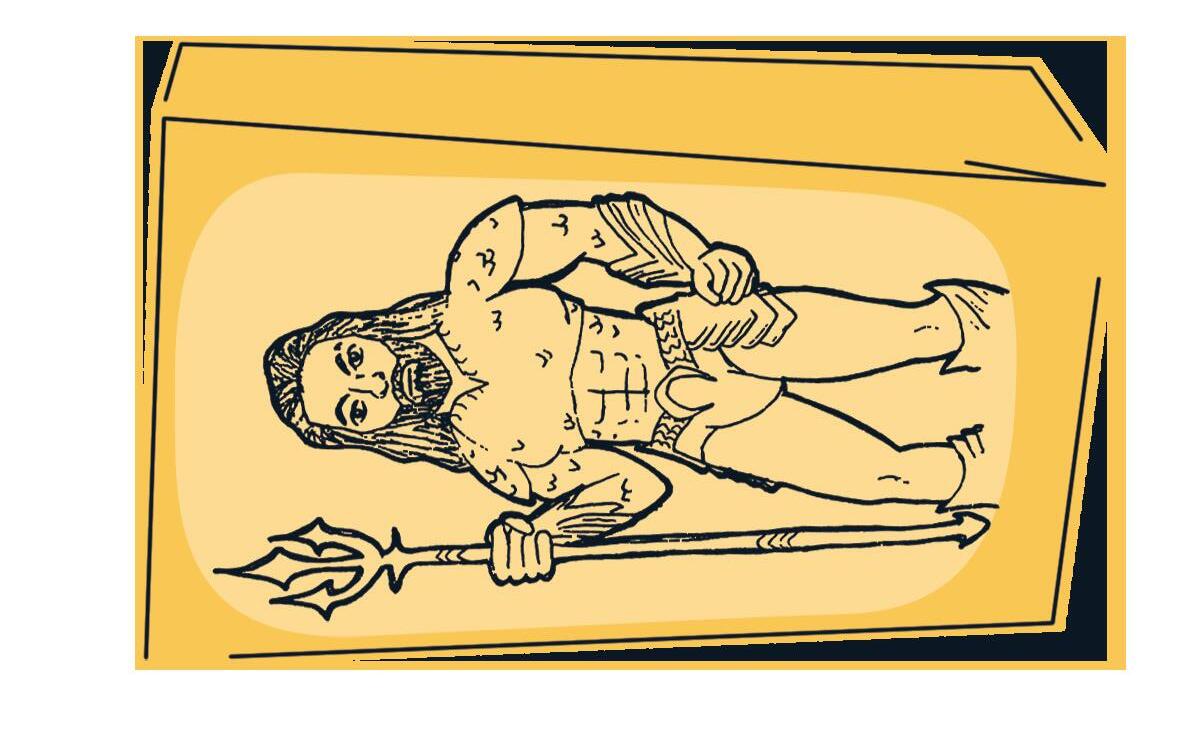

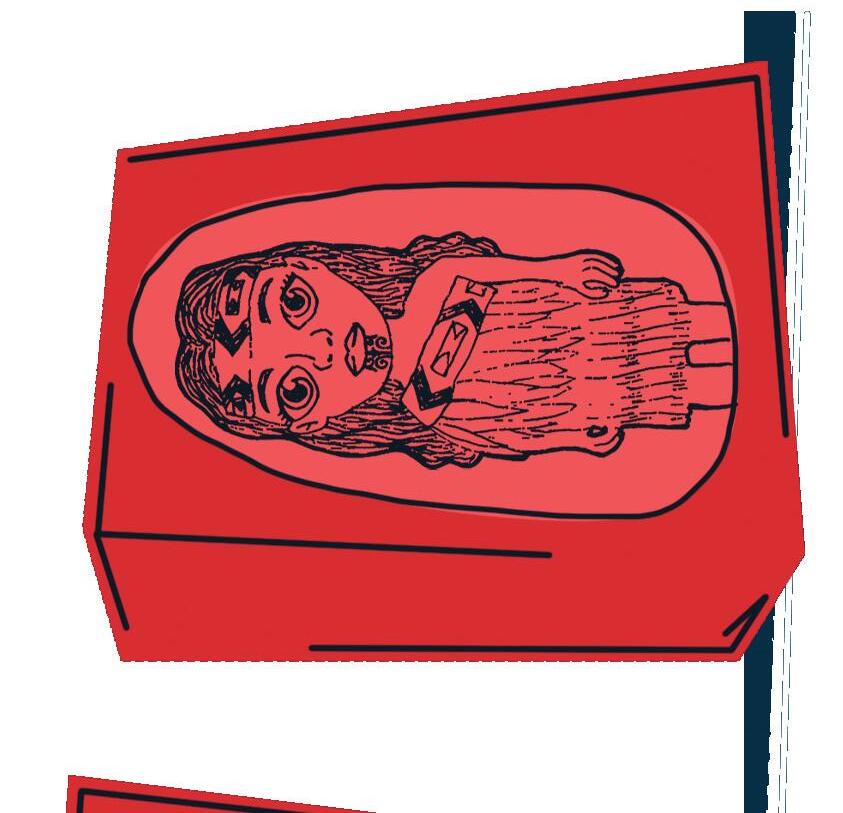


1. Bailed on Pint Night?
2. Hosted a potluck/dinner party?


3. Bought a $14+ bottle of wine?
4. Brought just a 6-pack on a night out?
5. Refrained from drinking because your tummy hurt?
6. Left a BYO basically sober?
7. Purchased a textbook (and used it)?
8. Declined free drugs?
9. Had freshers recoil when finding out your age?
10. Composted?
11. Played Dad tunes at pres?
12. Kept New World pot plant herbs alive for a week (or more)?
13. Used Bumble?
14. Used Hinge?
By Lotto RamsayYou know them when you see ‘em – when they actually leave the house, that is.
28. Gone to the farmer’s market?
29. Bought a pricey sex toy?



30. Been genuinely confused by a TikTok trend?
31. Skipped pres to rest before going out instead?
32. Kept up with the ODT?
33. Participated in a local protest?
34. Been an exec member for a club or soc?
35. Been asked for directions on campus?
36. Tried to quit vaping?
37. Turned your nose up at instant coffee?
38. Been sober for two weeks or more at uni?


39. Called it a night before 11pm?
15. Gone to Pequeños Jazz Night?
16. Bought a real bong?
17. Been a class rep?
18. Been a class notetaker?
19. Played board games at Woof!?
20. Paid your own Student Health bill?
21. Set boundaries in a relationship?
22. Been to therapy?

23. Driven somewhere within walking distance?
24. Packed lunch instead of buying food on campus?
25. Purchased tupperware?
26. Been excited about blankets?


27. Made (and/or stuck with) a flat chore chart?
40. Been shroom collecting?
41. Cooked a roast dinner?
42. Created (and followed) a study schedule?
43. Had a nap on campus?
44. Been to Inch Bar open mic night?
45. Voted in an OUSA referendum?
46. Thought the Cats queue was made up of literal infants?
47. Been to the Hocken library?
48. Taken up crochet or knitting?
49. Broken up with someone in person?
50. Submitted something to Critic?







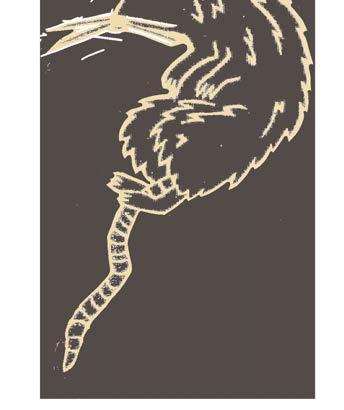
Your score: Less than 10
If you answered ‘yes’ to more than half: you’re a Critic-verified Dunedin Old. Read on for specifics – but first, grab your glasses.
You’re bright-eyed, bushy-tailed, and probably don’t have pubes in weird places yet. You fall asleep watching live streams. Your parents wheel your suitcases for you. You pretend to like coffee. There is a serious risk that I will mine your skin for its youthful, youthful collagen.

Your score: 10-19



Your score: 20-29
Some people act like freshers for longer than others, but not you – you’re rapidly approaching Fresher Death. It’s like twink death. It WILL come for you. Have you heard of second puberty? There are so many places one can sweat from. Symptoms of Fresher Death include: RTDs suddenly tasting too sweet, hangovers feeling like fucking Covid, and realising you can’t dump all your shit at your parents’ forever.


You may or may not be an actual millennial, but you could pick ‘Millennial Pink’ out of a Resene palette. You regularly post Close Friends stories. All the meme page admins you grew up with have kids now, and you hope they’re okay. You’re a bit insecure about your phone case, but not enough to do anything about it. Your friends give their pets suburban dad names.

Your score: 30-39
Anyone around you could be TikTok famous, and that scares you. You have spent ‘me time’ building your LinkedIn profile. You RSVP to events. You fantasise about repainting furniture and backing up your hard drive. You feel like you should start buying supplements. fucking Covid, and realising you can’t dump all your shit at your parents’ forever.
Your score: More than 40

You live in constant fear of being face-to-face with a QR code. Looking at an energy drink gives you anxiety. You’d “touch grass”, but if you so much as laid down in the dirt you know that the earth would permanently reclaim your weary bones. You thought you’d only be in Dunedin during your undergrad, but for some goddamn reason you’re still here –like that one high school graduate who still visits school to have coffee catch-ups with the teachers.










Disclaimer: Critic Te Ārohi does not condone property damage.
Ah, the ‘90s. An era which saw the fall of the Soviet Union, the rise of the internet, way too much double denim, and a little thing called neoliberalism — responsible for causing the biggest and fastest privatisation and commercialisation of education. Tertiary fees soared, and as the prices rose, so did the people.
Neoliberalism has become a buzzword for leftists and academics to vent about the skyrocketing price of oat lattes. Last year, Critic Te Ārohi dedicated an entire issue to the haggard ideology. But neoliberalism wasn’t always so omnipresent, and the sweeping fee rises across courses weren’t rolled out without a fight.
Students at Otago in the ‘90s were not the type to bend over and get fucked by Roger Douglas and his shitty economic theory. They took to the streets in massive numbers, occupying government buildings, MP offices, and (most famously) the University registry in the Clocktower. And leading the charge during his tenure as OUSA President in ‘93 was none other than our new Vice Chancellor: Grant Robertson.


Critic Te Ārohi looks at the history of student struggle against The Man (neoliberalism, but the word gets old).


Neoliberalism inspired a good seven years of mass student political organisation and protests attempting to get rid of it. The fuss? Neoliberalism was introduced by the 4th Labour government in the mid-80s when ol’ mate Roger practically said, “Let's make lots of money by selling off all our assets and cutting funding to state sectors” — Otago University among them.
Even the nerdiest of Pols majors are boggled by the term ‘neoliberalism’, so here’s a brief explainer from Critic’s former political editor Annabelle: “[Neoliberalism] is essentially industrialised capitalism. It’s ‘the system’. It’s trusting ‘the market’ to sort out any and all problems that might arise. It focuses on eliminating regulation, lowering trade barriers, increasing privatisation, and moving away from a ‘state-controlled approach’.” It’s what means you have to pay exorbitant fees for a uni education.
As with most global fuck-ups, America and Britain were at the scene of the crime. Upon Ronald Reagan and Marget Thatcher's laissez-faire love affair, New Zealand adopted their bastard son, Rogernomics, in 1984. As baby Rogneromics grew, so did ‘90s tertiary education fees, rising from around 20% to 30% per year over a five year period.
To give an idea of the scale of the fee rises we're talking about, Otago Politics professor Brian Roper told Critic Te Ārohi he graduated from a six-year Politics degree with a student loan of just “$1100”. That’s practically the cost of one paper now (POLS102 is $981.75). Even accounting for inflation, that’s a pretty big fucking difference.
This particularly affected Medicine and Dentistry students (who already had the highest fees on campus). Thirty years of financial gatekeeping later, and you’ve got a whole cohort of elitism on our hands who'd adopted the individualistic “every person for themselves” meritocratic mindset of neoliberalism. And that’s not to mention disadvantaged aspiring students who were completely priced out of tertiary education. The emerging political ideology provided a breeding ground for political apathy. When Grant Robertson was elected for presidency in '92, he told Critic at the time that he thought there was a new class of students developing in the wake of increased fees: “Ones that do have enough money and don’t give a shit about anyone else. It’s more than apathy — it’s straight out individualism. They only really care about themselves. Increasingly, people are set up to think about themselves, and so they do [...] Those who can afford to be here are here, and trying to prick their social consciences is sometimes very difficult.”
But the increased fees weren’t the only thorn in students’ sides. That year, the loan scheme was
introduced to replace student allowances. Student allowance fell from a 95% eligibility rate to only one third of students being eligible within a few short years. Meanwhile, student loans accumulated interest (even whilst studying) at around the 7% mark. Otago students went from having a living wage that supported them through their degree, to having some of the highest tuition fees and lowest student support in the OECD (first-world).
Student apathy was — and has since been — an issue. Just look at the uncontested OUSA Executive positions of last year. But decades ago? Students got mad, mad enough to unite and engage in mass activism. And so it began: massive week-long occupations, riots, and any manner of disruptive shenanigans.
It was Grant Robertson who trailblazed (we think) the student activism-to-Labour Party pipeline. In ‘93, Robertson mobilised a “raucous protest” on Union Lawn against a proposed 15% course fee, that saw riot police and the arrest of thirteen students — including The Big Cheese himself. Reminiscing about the event with Critic in 2016, Grant admitted that he “kind of knew we couldn’t stop the fee increase,” but was “trying to get the University to introduce a hardship fund for students who couldn’t pay” — a goal he had going into the job.
From the Union Lawn, Grant led the crowd of around 1,000 students who’d accumulated at the University registry in the Clocktower. The target was a Uni Council meeting and for many students, this was their first ever protest. “If there had been one cop guarding the door, many would have been too scared to do it,” said Brian Roper, who was there when it popped off. The students occupied the hallway, stairs, and entrance of the registry. “There was a lot of tension outside,” said Grant. It was for naught: the fee increases went ahead.
“[Then] the team policing unit came in [and] they lost it. [They] started beating the crap out of everyone,” recalls Brian. A photographer allegedly took a photo of an officer dragging two girls away by their ponytails (we could make a John Key joke here, but that would be flogging a dead pony). Twelve protestors were hospitalised and a fair few were arrested — with Grant thankfully escaping ‘incitement to riot’ charges which could carry a prison sentence.
The OUSA Exec at the time spoke out against the reaction from the authorities, saying it was “so unnecessary” for a “passionate but ultimately peaceful protest.” Far from deterring students, the police riot proved to massively radicalise the struggle. “[They] meant to suppress the movement, yet had the opposite effect; [they] inflamed it,” said Brian. An OUSA Student General Meeting was held

immediately after the police riot, in which roughly 200 students turned up (numbers OUSA can only dream of now).
The climax of the student protest movement was the 1996 week-long occupation of the clocktower complex (the reason for that big glass screen now around it). Many of the student activists parked up for the long haul in the tertiary equivalent of a slumber party. We’re talking sleeping bags, mattresses, food supplies, and boom boxes blasting Rage Against The Machine. Even Dunedin North Labour MP Rachel Brooking (then Admin Vice President of OUSA) said she stopped by for a nap, following in the footsteps of Grant Robertson.
“The mood was joyful and at times it was tense,” said Rachel. She described one meeting with the Uni Council where they threatened to expel student activists from Uni. At that point Rachel “walked out of the meeting [...] I don't normally walk out of meetings.”
The Clocktower occupation became the “platform for expressing opposition to the neoliberalisation of tertiary education,” said Brian. In other words, Brian’s happy place. Rachel recalled “We thought it was prohibitive for only some people to be able to afford to go to university where you are gonna have these huge, huge loans.” Clocking up tens of thousands of dollars in debt with low employment opportunities upon graduation isn’t very appealing, it seems. In fact, between 2005 and 2022 tertiary student numbers have declined by around 100,000 across the motu (despite population growth of over 1 million), contributing to Otago Uni’s recent budget hole. The recent decline is the product of a complex shitstorm of circumstances, but one thing’s for sure: neoliberalism’s insidious invisible hand is in the mix.
After the ‘93 riots, police were reluctant to go down the same path again (whacking under 25s with sticks probably wasn’t the greatest look) and so the Clocktower occupation continued uninterrupted. For the whole week, the occupation of the Clocktower complex garnered national media attention. As word spread, similar occupations cropped up at other universities in Aotearoa. Student political engagement was at an all time high, and for a minute, students thought that they could win.
Sadly, they didn’t. At least not in the way they’d hoped. Current student activist (whose recent antics we’ll get to soon) Jowan said that while “the ‘90s stuff was hugely disruptive, it wasn’t massively effective.” According to Peace and Conflict Studies lecturer Richard Jackson, neoliberalism was “such a powerful wave that no matter how much protest
there was, it wasn’t able to be stopped.” Brian was slightly more optimistic: “The protests put the breaks on neoliberalism, even if we couldn’t stop it.” After the hard-line government austerity of the 4th National Government, the 5th Labour Government, between 1999 and 2008, “softened” neoliberalism by taking action such as removing interest from student loans. Students still have crippling student loans amid a cost of living crisis that’s draining already scant pockets, but we ball.
In Richard’s opinion, a major issue for the ‘90s student activist movement was that “New Zealand culture was pretty dismissive of scarfies – they were seen as a privileged group and so weren't able to generate public sympathy.” Now that 30 years of neoliberal values have been etched into students’ psyche, everyone’s too busy clawing to keep their heads above economic waters to be able to fight back. “The whole thing sucks,” Brian summed up. Resigned acceptance of the status quo can often be mistaken for apathy. Richard thinks “students genuinely do care,” but the way education and society has been structured inhibits their ability to do anything. “The only way to secure your future is to finish your degree, get a job, pay off your student loan debt, and get a mortgage on a house,” said Richard. “It’s risky to protest as it could jeopardise your chances at any stage of your precarious position.” In other words, students are fucked and can’t complain in case they’ll risk getting more fucked. No wonder we’re all depressed.
“The way in which education has developed has occurred in a kind of disciplinary and controlling way that now makes political protest much more difficult,” said Richard. Specifically, student debt and fees are all ways to control and discipline students by putting them under financial pressure. Meanwhile, Brian pointed out that if our current funding model is “all you’ve known and all your parents have known, you don't know anything different.” A bit like how it’s difficult to imagine a new colour. According to Brian, this creates a pervasive feeling amongst students that “it’s just how it is.” There’s no sign of things changing any time soon, after all.
Jowan puts this perception of “massive student apathy” down to three things: anxiety, fear of consequences, and lack of inspiration. He reckons that students are generally pretty conflict averse. “I've got friends who want to do action, but are really scared,” he said. This isn’t helped by the increase in security culture on campus, and the harsh punishments for students who get apprehended.
When he spoke to Critic Te Ārohi in August of last year, Jowan and two non-students were facing $10k in damages to be paid to the Uni for the “wilful damage” (painting the walls and drilling holes in fire doors) of a room under construction in the Business School, in protest of Otago Uni’s “mismanagement” that they claimed led to the $60 million budget deficit. Of course, officials expressed frustration in the weeks following the protest that the costs of cleaning up the mess and repairing broken property didn’t exactly help the Uni’s budget problem.
Richard was on Jowan’s side, saying “the harsh prosecution of those who painted the room [in the Business School] shows just how little tolerance the Uni has.” To top it all off, Jowan thought that classic protest actions of marching and chanting were “boring” and “just kind of feel like the same old thing.”
Whether you think that protests are lame or are worried about the potential consequences from engaging in one, one thing is for sure: student political engagement is at an all-time low. You only need to cast your gaze to the OUSA candidate race (or lack thereof) to confirm this point. Out of the ten Exec positions, four ran uncontested. This included the Presidency which Keegan Wells won with a cruisey ten-minute spiel about pelicans and pastoral care against literally no one.
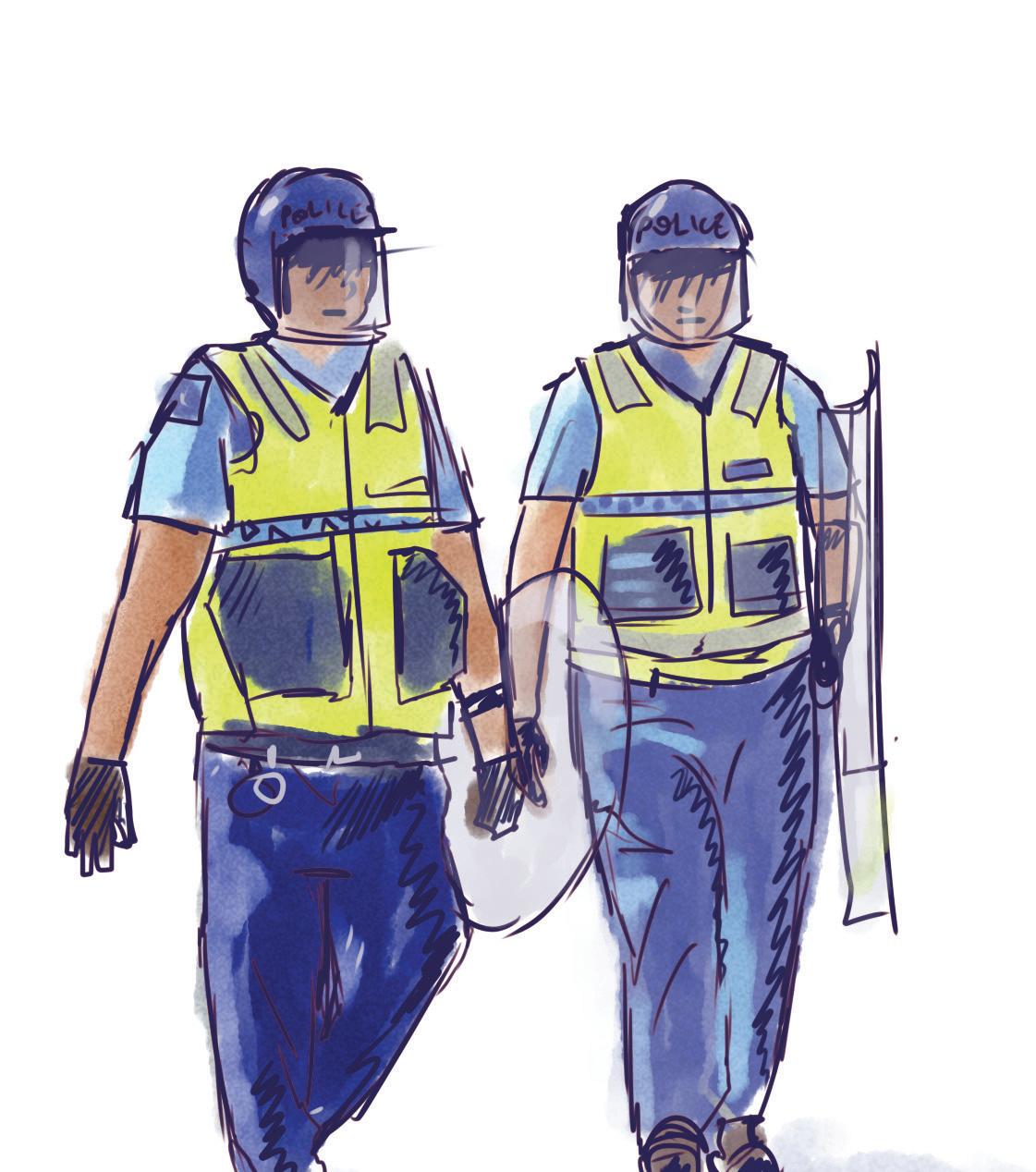
Last year’s announcement of tertiary staff cuts are part and parcel of the neoliberal agenda – the target of the ‘90s protest movement. Richard told Critic Te Ārohi that his job was “on the line”. He managed to retain his job, but the same could not be said for the hundreds of others who have been made redundant.
“It represents such a huge loss for the Uni,” said Richard. “We could figure out alternative ways of doing things but there is no appetite for real consultation [with staff and students]” – something that received significant push-back from certain cohorts, such as those from the Department of Science Communication, who expressed frustration that their voices weren’t heard in decisions that would significantly affect their futures. Instead, the Uni council has opted for a “top-down corporatist approach."
Despite the dire situation, some still have hope. “There will eventually be an upsurge,” said Brian. Admittedly, he thought it would happen back in 2011, but like that psychic who predicted the world would end in 2012, he’s sure that it’s coming at some point. In the meantime, Richard said that “things will get worse in the tertiary sector before it gets better.” With that said, Brian was confident that “New Zealand has no appetite for hardline neoliberal austerity [...] If the incoming National government tries to push through more major cuts, there will likely be strong response from students and unions.” Brian clarified that he was talking about “mass militant action” in the style of the ‘90s. It isn’t just ‘90s fashion that’s making a comeback.
Jowan had more of a 'glass half empty’ perspective: “I don't think we're going to stop these staff cuts in the way that we would like to imagine it, and I don't think we're gonna change the structure of the university.”
“Students need to find new ways of resisting,” Richard reckons. In his eyes, the Uni likes peaceful protests in the style of marching and chanting as it is largely symbolic and ineffective at disrupting anything, meaning that the Uni can either choose to ignore it, or (if you were to be cynical about it) acknowledge it for a positive PR spin. Richard reckoned that “protest movements are moving into a phase of more aggressive direct action.”
The Business School protestors last year clearly heeded this call, taking a more “creative” approach. Jowan, a student activist who was partially responsible for the graffiti and damaged fire doors, offers his perspective.
Jowan began by saying, “New Zealanders really like property, especially Pākehā New Zealanders.” In his view, calling property damage “violent” is pretty
ridiculous. “Property is not a sentient thing. It doesn't have feelings. You can be violent to a person, but you can't be violent to a bed or a chair or something in the same way,” said Jowan.
In a moment of wisdom rivalling a man discovering empathy on acid, Jowan mused that the real violence is what the property is doing to us. “The millions and millions of dollars to shift one department to one area and leave offices empty for years, and all this renovation work so that [by the time] we’re in our thirties, it makes like $4 million in profit for the Uni; that's the violence [...] The reaction by the University shows that it's a property management company and not an educational institution.”
So, with this in mind, Jowan and a number of other students, armed with paint and cups of tea, entered the Business School to do some “janky shit” (what is this, the ‘70s?). The idea came from the US, where a bunch of student activists barricaded themselves inside university buildings and used that barricaded defence to negotiate strong terms with the university to get change. “We felt that these rooms were just a canvas essentially for experimentation [and] recognised that everything was welcome and everything should be changed,” said Jowan.
After two hours of arts, craft, and crockery, Campus Cop John Woodhouse and Deputy Proctor Geoff Burns arrived on the scene. “Damage is damage,” said Geoff, “regardless of intent.” Or artistic talent, as Critic noted in our reports of the incident last August. The University of Otago’s Acting Vice-Chancellor Professor Tony Ballantyne told Critic Te Ārohi at the time that "peaceful protest has a long tradition at the University of Otago. It is important that students and staff are able to express their views and protest within the law. However, there is no place for vandalism or disorderly actions, particularly when the safety of others is put at risk. This is against the kaupapa of our community and is not welcome."
Apparently, the activists did a “pretty shoddy job” of the barricades, so Deputy Proctor Geoff Burns (“and his big muscles”) “ just blasted straight through
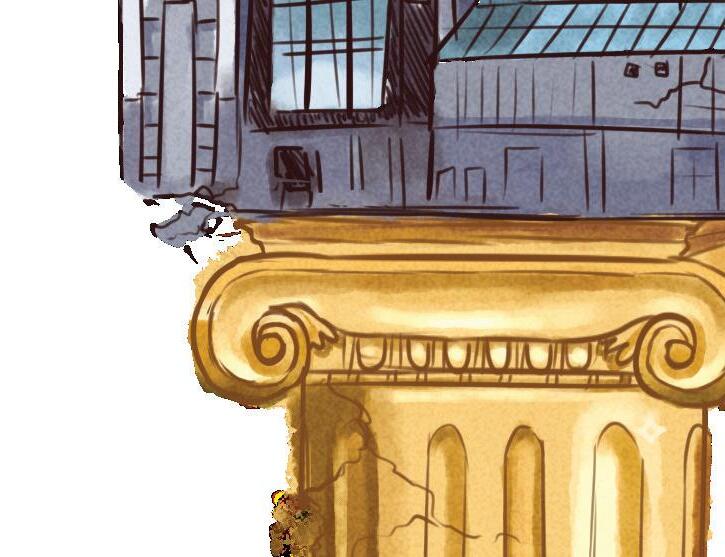
Enter Stage Left: Grant Robertson
The economic climate isn’t any better for students now. The tertiary cuts announcements last year brought the issue to the forefront once more, but the tree of academia has been steadily whittled down to its bare boughs since the birth of neoliberalism. Successive rounds of cuts have deteriorated the foundation of tertiary institutions: its courses and staff. Enrolments - the thing that the University lauds as the solution to its financial woes - have been on a steady decline as poor government support and living conditions have further deterred students.
Now that Grant Robertson has been announced as Otago University’s newest Vice Chancellor, it’s as though the pioneer of the local student resistance movement against neoliberalism has come home. One can only hope it’s to clean up the mess that’s been made in his absence. Time will tell what his tenure at the helm of the ship will hold, but OUSA, the Uni, and students alike are holding their breath
and students alike are holding their breath



‘While My Guitar Gently Weeps’ - Prince, Tom Petty, Steve Winwood, Jeff Lynne, more Taking place at the 2004 Rock ‘n’ Roll Hall of Fame, two members of the Wilb’s help sing the ‘Quiet Beatle’ banger “While My Guitar Gently Weeps” as a tribute but the main standout is fellow Hall of Fame Inductee of 2004, Prince. Lurking in the background playing along simply, he enters the light to play the best guitar solo of all time. Seriously. Rumour has it he was upset that Rolling Stones didn't include him in a ‘Greatest Guitar Players of All Time List’. Turns out Tom wasn’t the only petty one on stage.
The Chicago Rat Hole is just that: a rodent shaped hole ina Chicago side walk that was catapulted to stardom in January this year, spearheaded by a Twitter-wielding Chicagoan comedian, and the rest is history. Absolutely worth the read, especially considering Dunedin's recent events with rats and the way so many students bro’d out on the side of the rats.
‘Yoda eats Hamburger while my parents fight downstairs’
Again, exactly what it sounds like: following the banger that is LEGO™ Yoda CBT, the funny little green fella from Star Wars has diversified into the field of ASMR, with a good bit of mouth-squelching, squeaking, and rather pleased moaning, juxtaposed against the muffled sounds of an argument, but it is mainly drowned out by the borderline erotic munching of that viridescent elder of the Force.
The campus clap spot
Not clap as in dem cheeks. This is even cooler than sex. The clap spot is in the middle of a circular red brick parking lot between Mellor Labs and the Science Lib. Stand in the middle, clap, and listen. A mate of mine was dragged there as a fresher by an older student on his way through campus years ago, and I thought he was pulling my leg, but nope. Just do it. Trust us. You know you want to.
Audio Visual Dropkicks new single, ‘Box Dyed Hair’
Put it in your calendars! Coming up March 8, the absolute troopers that make up the Audio Visual Drop Kicks have a new single ‘Box Dyed Hair’ coming out, and they are debuting it at U-Bar alongside Caribou and The Beatniks. Bound to be full of sweaty second-years, so to all you freshers wanting to get amongst the culture, be sure to turn up around opening to get a good spot.
Uncharged vibrators
Oi nah, I know I'm not alone when I say that there is nothing worse than being midwank after a long day and having your Satisfyer Pro die on you. What am I meant to do, use my hands in manual mode like it’s the fucking medieval times? Treat this as a cautionary tale; remember to charge your vibrators.

 BY SAM SOPPET
BY SAM SOPPET
Picture this: you’ve been riding the bender-coaster that is Flo and O-Week, you roll out of your bed on the wrong side of midday, and in a rare sober moment for you (or any student), you realise that your flat is a tip. A bombsite, even. Sure, you rush around and do your laundry, but the carpet is straight-up manky. Crumbs not far off the size of golfballs litter the already stained surface. All you wish for is a vacuum, and eventually you find one in the most deranged fucking place. You turn it on in your optimistic fervour, but shit’s more clogged than your lungs after two years at uni. It doesn’t suck (not relatable), and when you turn it on it makes the flat smell like a mix of vomit, unwashed ass, and playdough.

definitelydon'tuseittosuckupvomit.Also,please





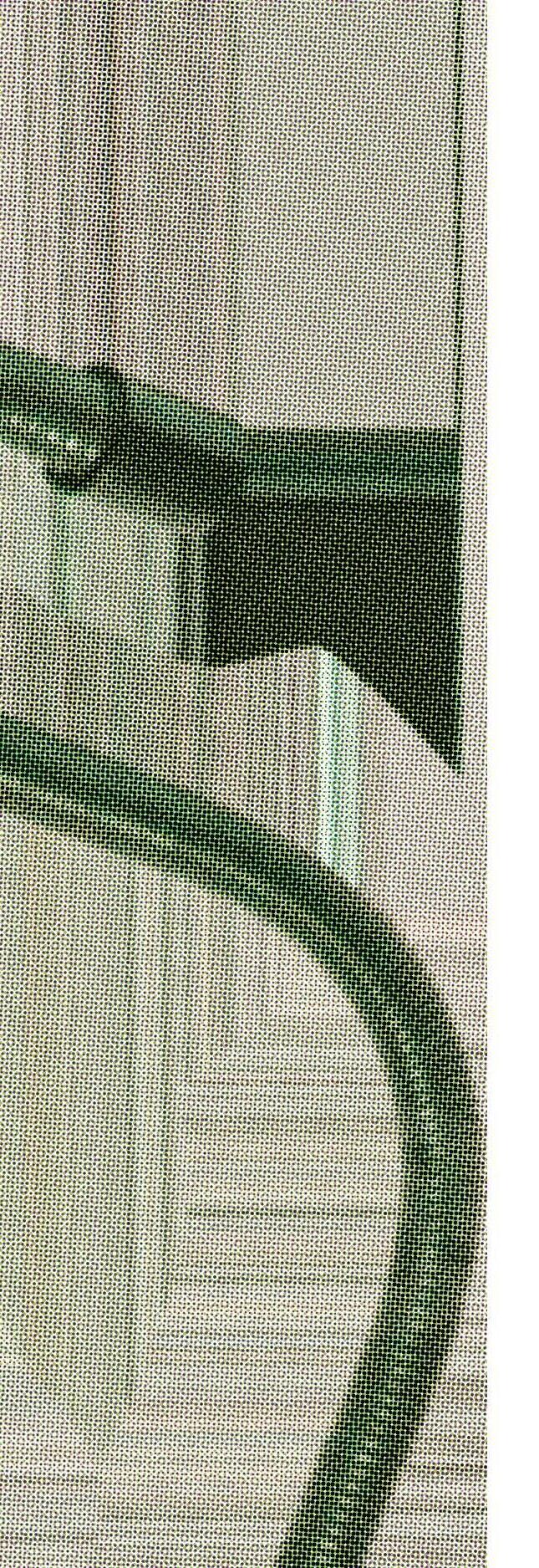

Max Came is the frontman of indie rock band Hot Sauce Club, and has recently created VELVET the label., alongside Will Georgeson of Pool House and Max Hackshaw of Frank on Tap. VELVET exists to promote artists around New Zealand and the world. It's currently made up of the three bands but looking to eventually expand. Critic Te Ārohi caught up with Max to talk about the future of their new project.
When asked about VELVET’s goals, Max explains that, “The overarching goal is to operate as a self-sufficient entity and eliminate the need for outsourcing to other organisations,” promoting, managing and marketing artists independently.
Hot Sauce Club hails from our very own Ōtepoti Dunedin, while Pool House are from Ōtautahi Christchurch and Frank on Tap are based in Tāmaki Makaurau Auckland. While these bands all reach a similar demographic in the New Zealand music scene, their nationwide scope allows each band to promote one another in their respective cities. “We wanted to create a combined resource pool so we could take on a strength-in-numbers approach and promote and collaborate under a larger and more credible industry entity,” says Max.

VELVET has been in the works for over eight months, with its announcement coming on the January 30th and a national launch tour beginning in Christchurch on the February 16th. The process of launching a label has been a bit trial and error, as Max shares, “The industry is pretty tricky to navigate, and you can get all the advice in the world, but at the end of the day you just have to get out there and do it to see what works.” A major blueprint for VELVET is Wellington-based group ‘A Low Hum’, who have
early 2000s. “We were fans of how they wanted all ages to experience live music – especially since the younger generation are the future music lovers. "We plan to do all ages circuits where we can. We hope the approach can bring in more people and new people with free gigs as well,” says Max. Another inspiration for VELVET has been Garbage Records: “They have a neat DIY approach, doing it all themselves with recording, release, and creating a whole art scene [...] We are hugely inspired by Flying Nun for the same DIY attitude that paved the way for New Zealand music.”
VELVET operates as an indie/alternative rock outfit but is willing to expand into other genres in the future. Currently, they are continuing their New Zealand tour, having played shows in Christchurch, Dunedin, and Queenstown. They are also in the process of sorting out merch and physical releases, with Max stressing the way in which “physical releases are an important part of New Zealand music history that still needs to be held onto within the digital age.” On the experience so far, Max concludes, “We didn’t know what to expect, but it has been some of the sickest shows we have played yet. The crowds knew the words to most of the bands’ songs, and were super supportive of, and receptive to, the idea of the label. I’m buzzing.”
To keep up to date with future shows and releases you can follow @velvetthelabel.nz on Instagram, as well as Hot Sauce Club (@hotsauceclub), Pool House (@poolhouse. music), and Frank On Tap (@frankontap).

Mālō e lelei everyone, my name is Telekalafi Likiliki and I am the President of the University of Otago Pacific Islands Student Association (UOPISA). I am of Tongan descent and I hail from the villages of Tongoleleka, Ha’apai and Ma’ufanga, Tongatapu. It is an honour to represent and advocate for our Pacific students this year and I hope to meet all your beautiful faces this year. If you see me around, don’t be shy! Come and say hi!
As time goes on and uni becomes more hectic, you may start to feel homesick. Believe me, that’s normal! Even as a student who has been at uni for a few years now, I still get homesick. Here are a few tips that helped me get through those hard times!
Tip 1: Make sure to call your family and check up on them. Not only are you experiencing life without your family, your family is experiencing life without you too.
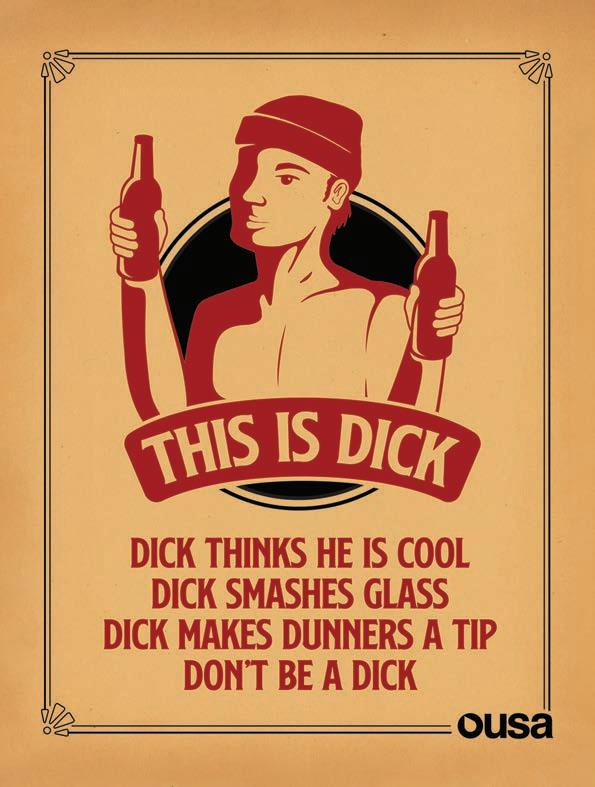
Tip 2: Make good friends! One of the best ways to make it through uni is to make good friends. These people will be your lifelong friends. Hang out with your mates after a long day of uni. Have a movie night, watch a rugby game, go for a walk to Marina. Make friends who you can turn to in times of need, who will keep you in check, and who you can work on assignments with as these people will be the people you make life long memories with.
Tip 3: Don’t forget your ‘why’. Never forget those people in your lives who sacrificed a lot for you to be here today. We are not only here for uni but we are also here for the village that brought us here.
To finish off, I’ll give you a Tongan proverb that has stuck with me during my time here at uni. ‘Oua lau e kafo kae lau e lava’: Stay positive and count your blessings. Have a blessed year ahead of you, and I’ll see you around campus x
Malo ‘aupito
Telekalafi Likiliki

AQUARIUS
Aquarius, 2024 is the year to be you. Wear that kinda ugly op-shop top or those shoes that hurt to walk in. You make it look good!
Dunedin hot spot to visit: First Church

Pisces
Sometimes it feels like everyone hates you, and maybe they do. You’re still hot though, so… priorities.
Dunedin hot spot to visit: Rob Roy
Aries
Trust yourself to know when the time has come to leave town early. All those 2am bedtimes can be detrimental to your health and wealth.
Dunedin hotspot to visit: Your bed for once
Gemini
Curiosity killed the cat and Gemini, you are curious. Don't screw the crew!
Dunedin hotspot to visit: The Botans
Leo
Leo, you are ruled by the sun and that bitch is on her way out faster than a bullet train. Soak up as many rays as you can while it lasts.
Dunedin hotspot to visit: Signal Hill
Libra
Staring at the blank page before you, open up the dirty window – should probably get your landlord onto that.
Dunedin hotspot to visit: Macandrew Bay
Sagittarius
All of your hard work is coming to fruition. The peace you are experiencing right now isn’t just the calm before the storm, so stop worrying.
Dunedin hot spot to visit: Sandfly Bay
Taurus
You’ve done it, you’ve survived the first week of the semester! But have you been forgetting your deodorant? Persistence over perspiration.
Dunedin hotspot to visit: John Wilson Drive
You need to stop crying about TikToks and start crying about your life xx Wish you all the best boo.
Dunedin Hotspot to visit: The library
Virgo
Deep breaths won't cut it this week. The need for some heavy meditation is on the horizon.
Dunedin hotspot to visit: The Warehouse
Scorpio
Why is everyone so obsessed with you this week? It's hard being that bitch.
Dunedin hotspot to visit: U-Bar
Capricorn
Academic weapon mode starts now (*flame emojis*). The first week went well but this is the week to lock in with your study buddies.
Dunedin hot spot to visit: North Cemetery

1/3 block firm tofu
¼ cucumber
¼ cup edamame beans
1tsp soy sauce
1 clove garlic (minced)
1 tbsp gochujang
Oil (for frying)
FB marketplace, sogettingconsiderone)
Gochujang may be a somewhat unfamiliar ingredient, but it is really tasty on everything from tofu to fish to vegetables. You can get it from CJ Asian, Unimart, and I think even New World. It's not too expenny and a little goes a long way.
*If you have a jar lying around, you can collect the rice water. You can use this to wash your hair, water your plants, or even for skincare!
Step 1: This recipe is much easier if you have a rice cooker, but if you don’t, don’t fret!
If you have a rice cooker, put half a cup of rice in the bowl insert and wash it by filling it with water, swishing it around and draining it*. Repeat this 3-4 times until the water is running clear. Then put 1 cup of water in and chuck it on to cook in your rice cooker and forget about it!
If you do not have a rice cooker, do the same washing steps but in a pot. Then add 1 cup of water, chuck a lid on, and bring it to a boil. Reduce the heat (3 or 4 on an electric stove) and simmer for about 5 minutes, by which the water should be gone. Then remove from the heat and let sit with a lid on for 5 minutes.
Step 2: While your rice is cooking, chop or tear your tofu into bite-sized pieces. In a small bowl mix together the soy, gochujang, garlic, and about a tbsp of water to loosen it. Cover tofu with sauce. Heat a pan to medium heat and fry your tofu in a small amount of oil. You can get a bit of colour on it, or just heat it up; tofu can be eaten raw.
Step 3: Once your tofu and rice are cooked, cut your cucumber into cubes, and pour some hot water over your edamame beans. Let the beans sit for about a minute and then drain.
Step 4: Chuck everything in a bowl. I made it all cute for the picture, but it tastes better if you mix it! Enjoy!
By CHUNNY Bill SwilliamsYup, love ‘em or hate ‘em, they still make this stuff. Purple Gs are getting funnelled, chugged, vortexed, snorkelled, and otherwise demolished at high speeds – much like the endangered Goannas of its namesake. For some reason, every other person just assumed that the OG – the Purple G – just went under without making much of a splash. Well, you’d be wrong. This beautiful, absurdly purple, tongue-tinting, iridescentshit-staining, borderline tasteless, drop of godly nectar is back with a vengeance.
The only major drawback of this gorgeous bevvy is that for some goddamn reason half the bottle stores in Dunedin insist they don't make it anymore. The other half charges an arm and a solid chunk of leg, at 2.05 standards-per-dollar. It’s basically the (mildly) alcoholic version of those cheap plasticky-tasting grape sodas, the ones that came in a 24-pack of lil’ plastic chode bottles and were sold alongside sausage sizzles at primary school. You know ‘em. *Disclaimer: Purple Gs do not purport to be grape-flavoured.
Despite coming in a glass bottle, Purple Gs are lowkey flat. A bit like the flat, tennis court-boiled, ant-summoning soda that runs through every North Islander’s veins instead of blood. Considering that this could be deemed a ‘scathing review’ (what are you gonna do, criticise Critic? Sounds dumb as hell), these are actually far less punishing of a bev than you'd think. They make for a good addition to your arsenal for Kings Cup, Rage Cage, and any other game that essentially depends on you giving away your piss.
Purple G-fuelled interlude: Did you know you (allegedly) can't get done for drink-driving on e-scooters? That's something that really isn't talked about enough. Not that we endorse such tomfoolery, of course.
With these somehow being one of the cheaper RTDs available – maybe not for percentage per dollar, but definitely volume outright – these things will have you go into the bathroom sober, have a solid 40-second piss, and then have you rolling by the time you have that door unlocked, which took you a minute or two because you did a half-assed job drying your hands on your jorts instead of the provided hand towel.
This endangered species is arguably the only drink to hold a worse stigma than the old 12% Cody’s – AKA ‘court case in a can’. The actual taste hints at the aforementioned grape soda stuff, but if you watered it down and added the most vodka you could before you actually started to taste it. I doubt there’s a single RTD as scullable, whilst still tasting somewhat reasonable and without making you feel like you are going to fucking die after flattening a box.
Despite their decline in recent years, you do still see the odd cord hat-wearing, flannel over white shirt, absolute battler type strutting around Studentville with a box tucked up under their arm – often because the handle’s ripped from already getting stuck into them. And that’s a beautiful thing.
Tasting notes: Kinda like how you thought spray and wipe would taste as a kid
Chugability: Like drinking a frozen Fanta the next day, give or take floaters. 9/10
Hangover depression level: Less of a hangover, more of a sugar crash. 9/10
Overall: Not for the inferior. 6.5/10


Firstly, no. It’s pretty simple: if you both know you want to sleep with each other, and don’t feel like going on a date first, then there’s no reason not to. But part of you likely thinks that you should. Let’s unpack that: All of you have slept with someone you never went on a date with, and if you haven’t yet, you most likely will. The idea you should go on a date first is obviously not something that people practise, yet it’s still a deep seated social belief: “If you’re serious about someone, don’t have sex too soon,” (*cough* prude). However, at the same time, we also permit ‘hookup culture’ (which I’m obviously all for) as a method to have sex without the romantic commitment. Basically, whether you agree with it or not, they are both within the social norm. And both are sex. Drawing a distinction between dating and hookups seems practical, but is also detrimental. Fuck-buddies can turn into partners. You can go on dates with someone you know you don’t see anything serious with. Why does eating a meal
together magically make sex okay now? A date is not a permission slip to fuck someone.
After Covid, people tend to have an aversion to actually socialising, but they all still want a shag. Crazy concept talking to people, I know, but our parents managed to do it (for the most part) so why can’t you all? Hell, if you actually talk to the breatha or beezy you are rooting, you might find some hobbies in common. It’s far too common of an issue in this town; the infamous pump ‘n’ dump, the root ‘n’ scoot, or whatever you want to call it. Between social media and Covid lockdowns, it is almost as if we’ve forgotten how to socialise beyond the bare minimum shit party chat from a breatha who just sees you as a hole. When did the so-called dating scene become just going to parties, meeting someone, taking them home for a subpar shag, and then slinking out the door (or window) at some ungodly hour as if it never happened. Also, shying away from having a fucking conversation with someone who’s seen you buckass naked is cringe. Not to mention the horror stories of people catching STDs and other diseases from sexual interaction with people that they don't really know. A date prior could also be seen as a sort of screening process — time to work out if they are really someone you want to sleep with, because you can't really work out someone's vibe when they are yelling in your ear at a party and you are both drunk. Besides, isn’t the sex usually better if you at least know the person’s name to scream? To summarise, do the mahi and you get the treats. You might even make a friend along the way.


I, like many people, am a massive fan of men moaning during sex but unfortunately it has been a while since I have heard this live and in person.
A few months ago, I was scrolling through TikTok and an audio of Pedro Pascal moaning came up on my fyp (thank you algorithm). I hadn’t wanked off in a while so I saw this as a sign to lock my bedroom door, chuck my earphones in, and get to it. I finished quite quickly and then decided to have a wee scroll through the comments. I began to get nervous when I saw comments like, “Out of context this is hot, but if you’ve seen the bit of the film it comes from…”
After a quick internet search, I discovered that the audio I had just wanked (and came) to was from the 2018 science-fiction film Prospect. The reason Pedro was groaning and whimpering so loud was because, in this section of the film, he was getting his arm amputated without anaesthetic. On the second watch (this time without my hand down my pants) I could literally hear the buzz of the chainsaw in the background. I had orgasmed, but at what cost? (Well, an arm but fortunately not a leg).
Anyway, I have come to terms with the fact that I inadvertently wanked to a limb being severed, and life goes on. Sorry Pedro.

CHATGPT COULD NEVER. SEND ALL YOUR WOES AND WORRIES ABOUT FOES TO CHATGOTH@CRITIC.CO.NZ FOR TOTALLY REAL AND LEGIT ADVICE.
Hey girl!!!!
Just thought I would reach out with one of the issues I've currently been going through. Generally speaking, I'm a pretty happy guy with great friends and family around me. But I have an issue... My feet won't stop sweating!
The effect is accentuated by my plastic Birkenstocks but just generally things get sweaty down there. It's really impacting my dancing ability, which is pretty important to me. Help! Is this perhaps a symptom of my mental state being purposefully barricaded? Is the sweat a symptom of my emotions set to slip out at any sign of trouble?
Sincerely,
BirkenstunkBirkenstunk, listen: you’ve come to the right place. I have never set foot in a Birkenstock but I did step on a corkboard once, which I think is the same thing. I also sweat profusely, and nonstop, which is A) why this will never be a video segment, and B) why I wear black all the time – it doesn’t show sweat stains. I have seen lives ruined first-hand over that burnt-in black footprint Birk-stain. No one should look at your shoe and see how far apart your toes are. For an instant fix: paint the soles black. Failing that, take a pair from someone with grosser feet and then just blame it all on them.
Also, to quell your worries – sweating isn’t a symptom of your emotional dam breaking its barriers. This can usually be traced to an imbalance of the four humours, or a lack of dam fortification, and in that case I would recommend consuming more microplastics to plug the brain leaks back up. Instead, sweating is actually a symptom of water poisoning. Try removing water from your diet to cut the problem off at its source. I think they also treat overly sweaty hands with
mild electrocution – do you know anyone with a dodgy turntable who’d also let you rub your feet on it?
But seriously, socks are your best friend. Cotton ones though, or your feet will smell like yoghurt on a hot dashboard. Polyester and plastics are the enemy of the damp. However, I also posit going barefoot and just running with it (not too fast though, lest you slide away). Maybe it’s a hidden natural talent, making you naturally adept at ballroom dancing or moonwalking. You’d get real good at crossing wet floors if your feet are wet all the time. Plus, if you ever lose your friends on a night out they can follow the glistening prints to safety.
Yours truly (or until I hang you out to dry),



